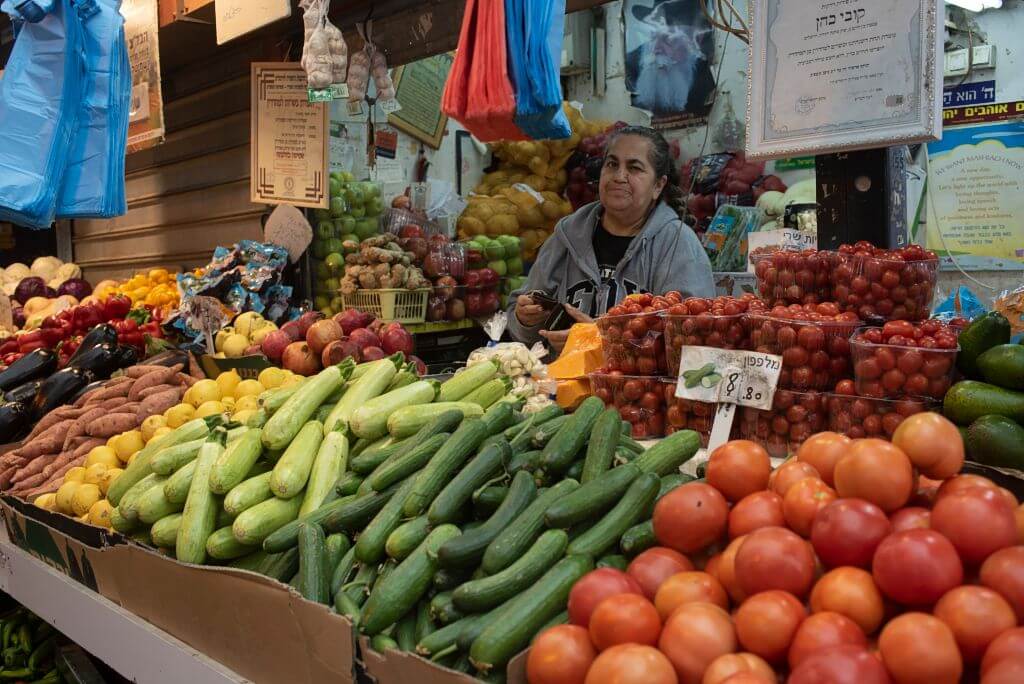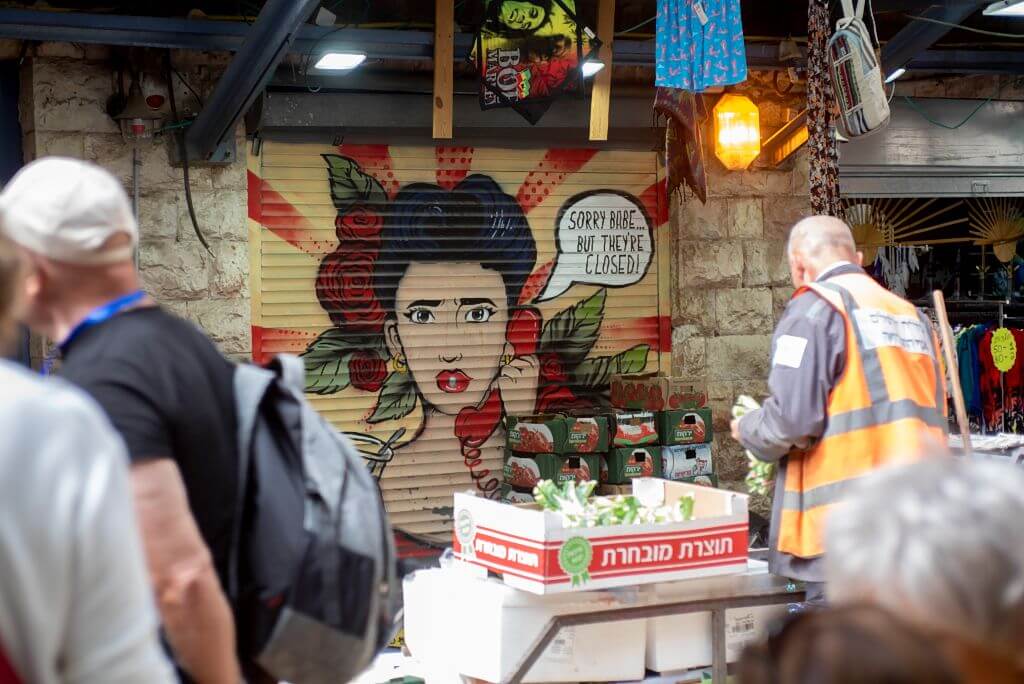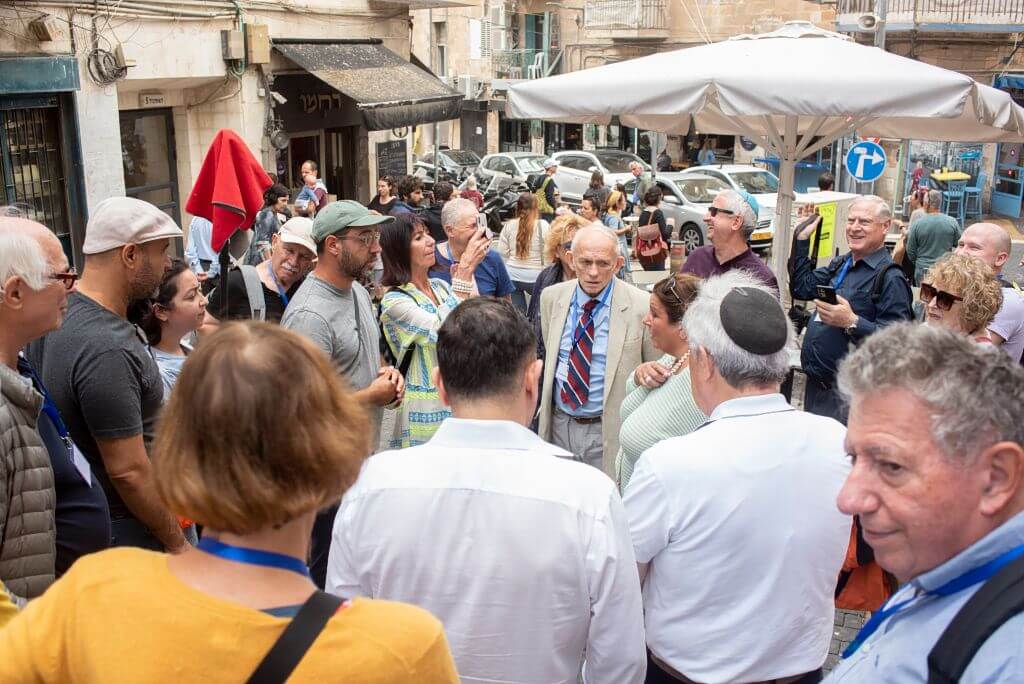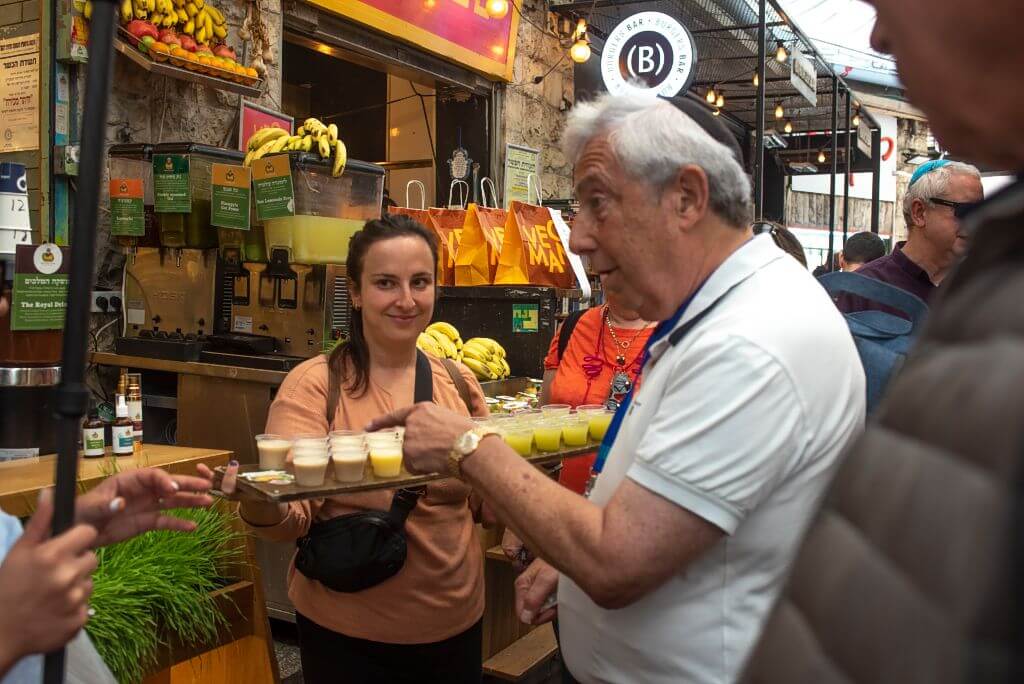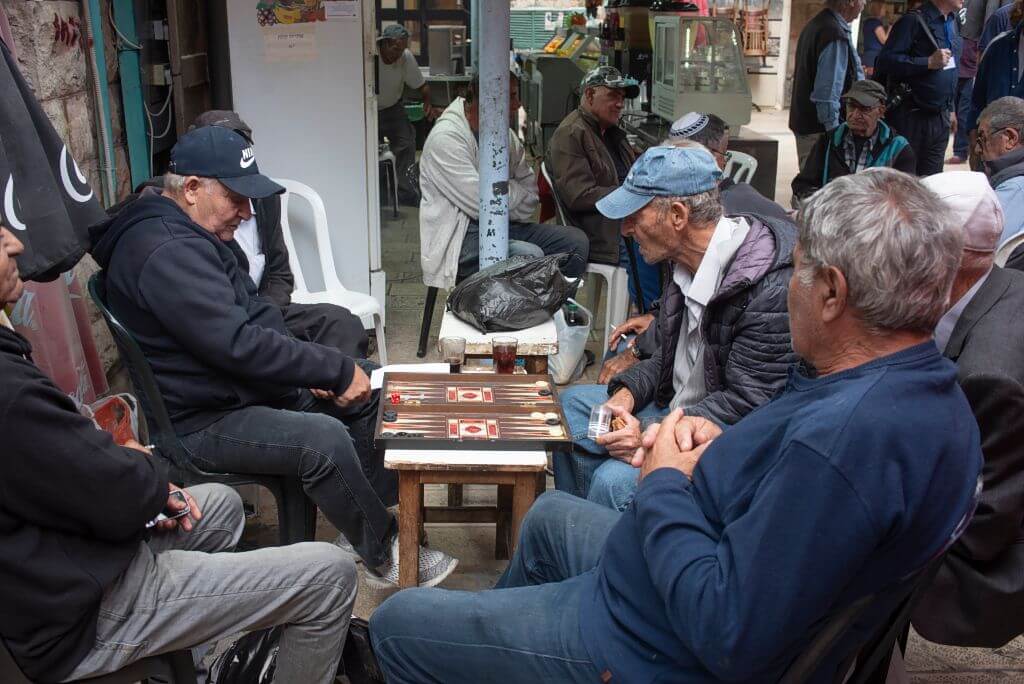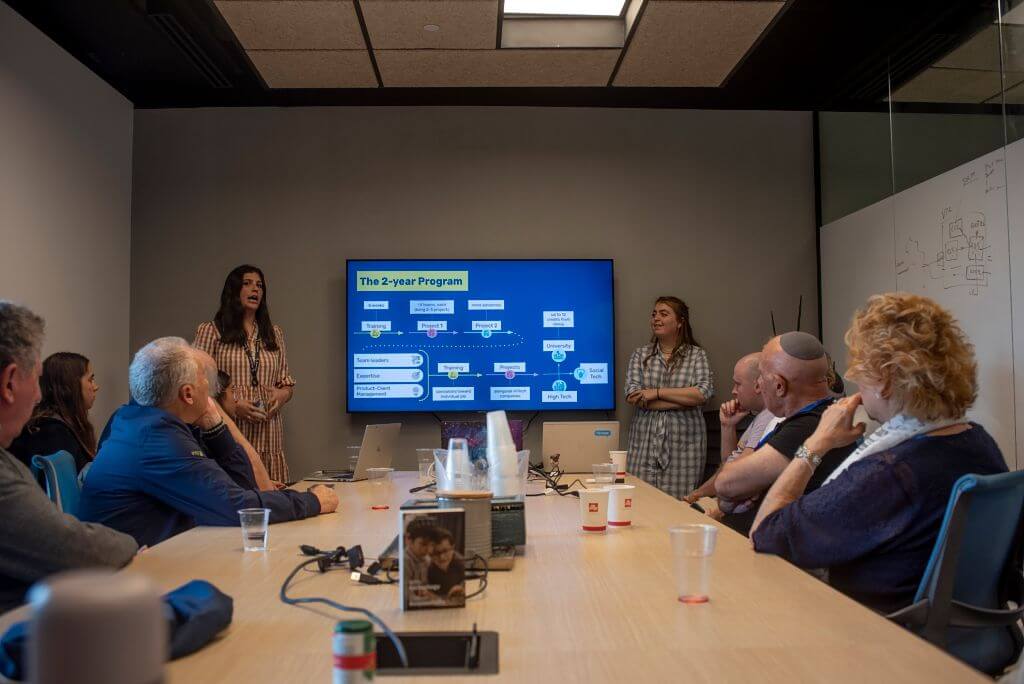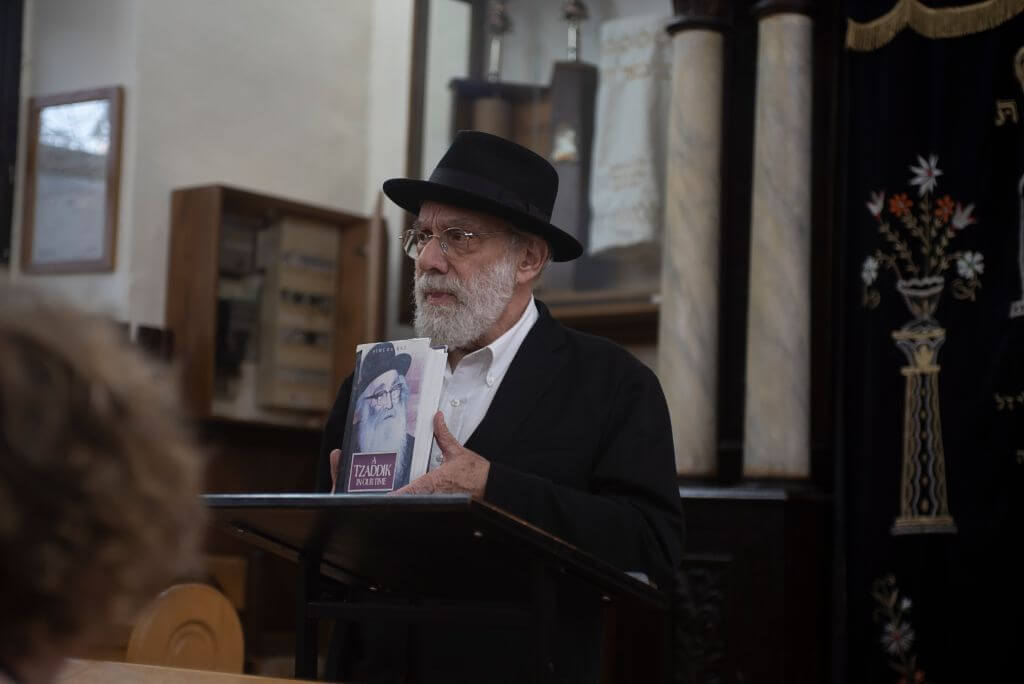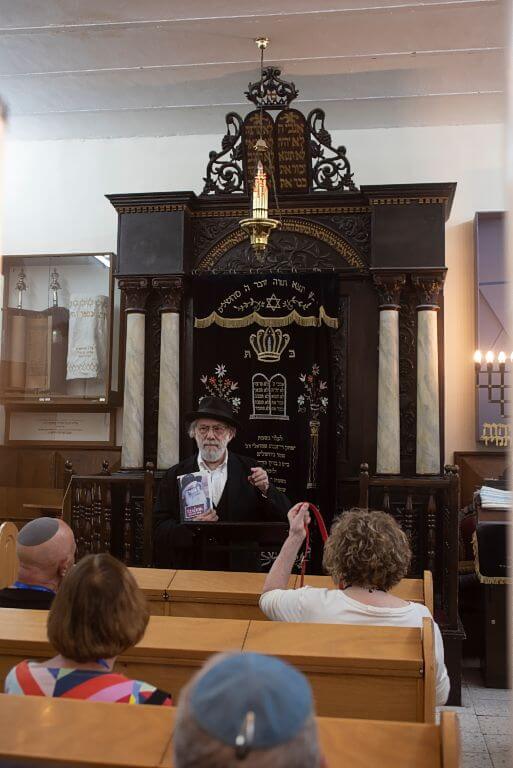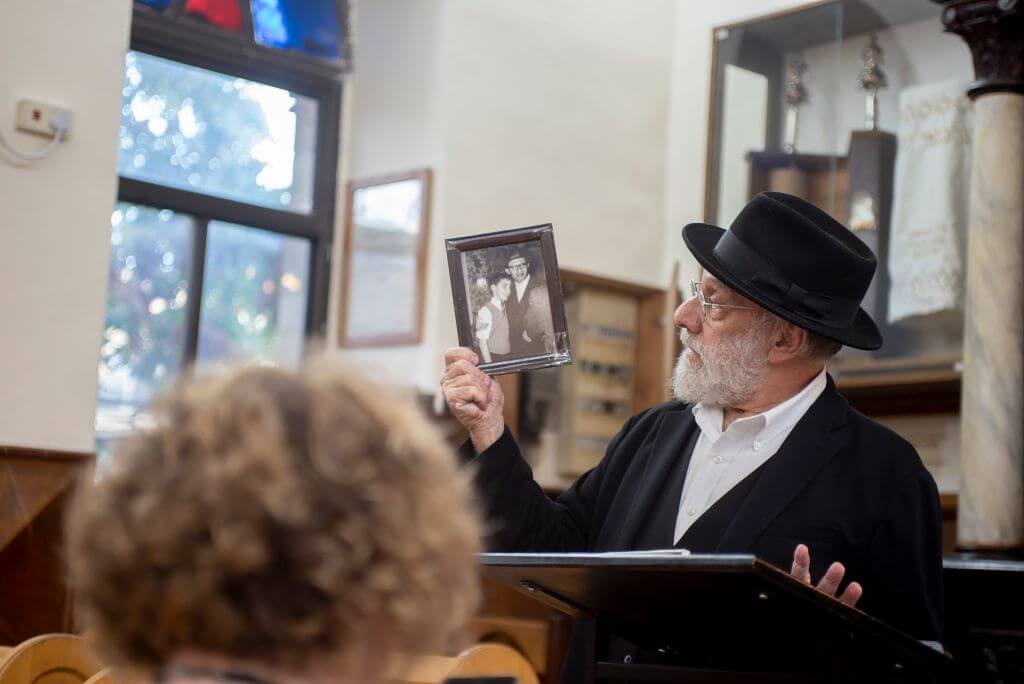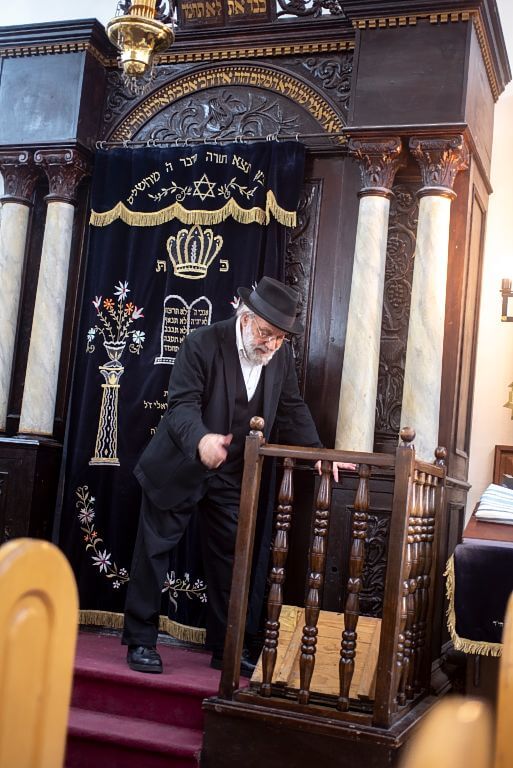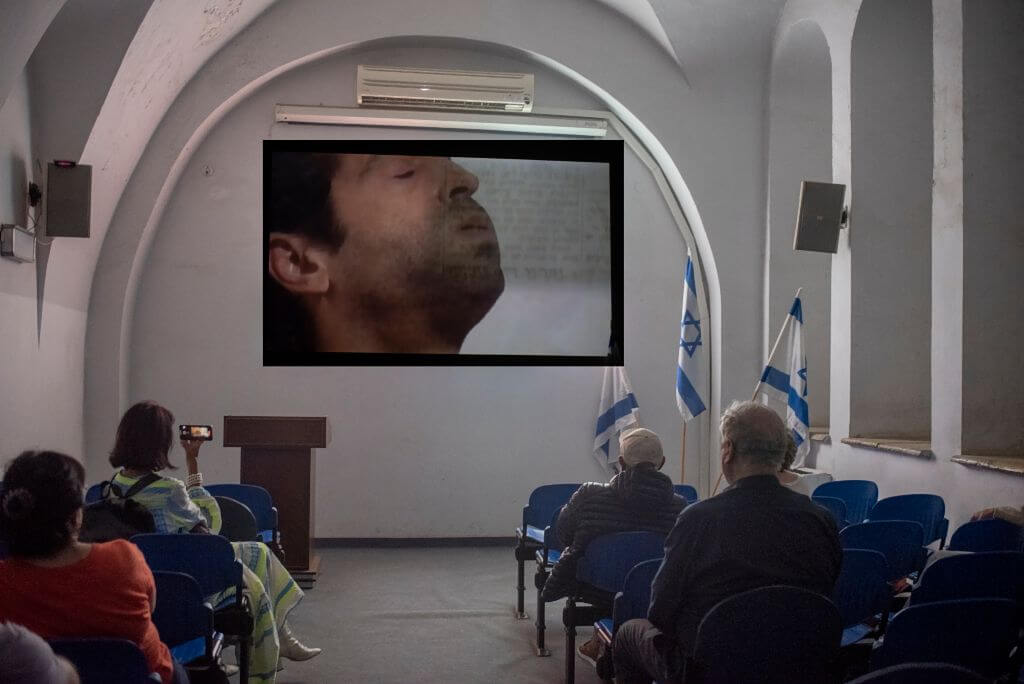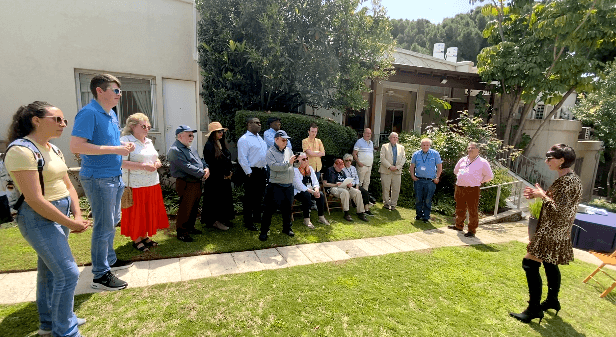Welcome to the Technion UK Israel Trip June 2023
Day 5 – Last day
Closing Session
At the final gathering of the trip, Alan and Ida addressed the group with heartfelt appreciation. Standing before the backdrop of the Technion – Israel Institute of Technology, they acknowledged everyone for their active involvement in this memorable journey through Israel. They fondly recalled the highlights of the journey, from meandering through the ancient pathways of Jerusalem, to feeling the pulse of modern Tel Aviv, and engaging in insightful experiences at the Technion.
The group were asked to fill out feedback forms and we went around the room and asked everyone to comment on the highlight of the trip. It was interesting to hear the different views from everyone, especially how all the people in the group has different highlights.

As the speeches continued, Ida captivated the group with enticing descriptions of future trips, encouraging everyone to join in the upcoming adventures. The group was assured that every trip, just like this one to Israel, would offer a unique blend of cultural immersion, historical exploration, and local encounters. The passion and enthusiasm left no doubt about the exciting experiences that awaited. Gratitude, combined with eager invitations for future explorations, brought a wonderful conclusion to a remarkable journey through Israel.
Technion UK Chairman
Paul Charney expressed his heartfelt gratitude to our group for visiting the Technion – Israel Institute of Technology in Haifa. He commanded our interest and dedication to learning and highlighted how such exchanges help foster international collaborations and contribute to a global community of knowledge and innovation. He hoped that our visit to Technion would not only enlighten us with new perspectives but also strengthen the bonds between our institutions, sparking more opportunities for future collaboration.
Baha’i Gardens
Evgeny, our guide, educated us about the Bahai Garden in Haifa, a sacred place named after Baha’u’llah, the second prophet after Muhammad. Baha’u’llah was sent to the Ottoman Empire and ended up in Acre, another holy place for Bahais, after purchasing a mansion there.
The Bahai faith, originating as a separate sect of Shia Islam, emphasizes the unity of God, religion, and mankind, acknowledging diversity and promoting world unity. Bahais have their scriptures, known as ‘the holiest book’, and adhere to specific laws, including daily prayers. The faith doesn’t have priests or houses of worship, emphasizing that everyone is equal.
The Bahai Garden is maintained by the Bahai community, which counts around 8 million members worldwide, with about a third of them in India. Even though Israel doesn’t have a Bahai community, many volunteers travel there to help with maintenance.
The Bahai community also owns the International Archives Building, which houses personal items of Bahais but is only open to Bahai pilgrims. The Universal House of Justice, the democratically elected Bahai government, operates from here, managing religious laws and finances.
Joining the Bahai faith requires accepting the holy books and prophets and signing a document. The faith has a significant number 19, symbolizing the 19 months of a year and 19 days in a month. Unlike many other religions, children aren’t born into the Bahai faith but can choose it after the age of 15. The age of 15 is when children can give consent in Persia / Iran.

Day 5 Album
Photo courtesy of Adrian Korsner
Day 4
Iron Dome
During our morning tour, we were joined by Benjamin and Montana, soldiers from the IDF’s public communications division, who guided us through our visits to high-security areas. Our first stop was at a live Iron Dome deployment location, the specifics of which remained undisclosed. Here, Lieutenant Hannah, the commander of the interception centre, provided us with an insightful behind-the-scenes look into the workings of the IDF and the Iron Dome. She shared recent incidents involving missile attacks and the rapid response required by her team. There is 24-hour surveillance by the member of this team, who need to be ready at any moment in case there is an air attack, that needs responding to. Not all attacks are responded to, only if the unit feels that the attack will endanger lives. If the missile is destined for an empty field, no action will be taken. There is a limited number of Iron Dome missiles, and each one costs approximately $50,000.
Northern Border

Our journey took us to Israel’s Northern border with Lebanon, a region of historical significance and present-day tension. Our IDF guides, Benjamin and Montana, offered expert insight into the area, sharing their knowledge on both past and current affairs.
They began by detailing the past conflicts that have taken place at this border. They painted a picture of a region shaped by strife and volatility, where skirmishes and larger-scale conflicts have left indelible marks. This historical context is crucial to understanding the present-day complexities of the area.
Benjamin and Montana then moved on to the current situation at the border. They explained that while the border might appear calm, the reality is more nuanced. The IDF maintains a constant state of alert, given the volatile history of the region and the ongoing activity of Hezbollah, a Lebanese political and militant group.
They characterized the situation with Hezbollah as tense. While no specific recent incidents were mentioned, it was clear from their briefing that the threat of conflict remains a constant concern. The group’s activities and influence in Lebanon have had significant implications for the stability of the border, and the IDF remains vigilant against any potential escalations instigated by Hezbollah.
Our visit to Israel’s Northern border with Lebanon was a sobering and illuminating experience. It highlighted the intricate dance of diplomacy, defence, and deterrence that characterizes the relationship between Israel and Lebanon, largely shaped by the presence and actions of Hezbollah. It was a stark reminder of the complexities of maintaining peace in a region marked by historical conflict.
Hezbollah Tunnel
After visiting the Northern border, we set out to another site, this time to one of the numerous tunnels that had been built by Hezbollah, with the sole purpose of infiltrating Israel from Lebanon after past the UN blue line in order to carry out fatal terrorist attacks. Our IDF guides explained that these tunnels represent a significant aspect of the security challenges Israel faces, particularly along its border with Lebanon.
This particular tunnel, like many others, had been found and meticulously monitored by the IDF. The soldiers shared details about their approach to this complex task. They had to determine the purpose of the tunnel, track its usage, and assess the nature of the activities taking place on the Lebanese side. This involved continuous surveillance and data gathering to ensure an accurate understanding of the situation.
We learned that this surveillance was not a passive process, but rather a strategic operation that required careful timing. The IDF waited for the right moment to shut down the tunnel, a decision based on a variety of factors including the level of threat it posed and the strategic implications of its closure.

The shutdown of the tunnel was a testament to the IDF’s capabilities, showcasing their vigilance, strategic planning, and commitment to maintaining the security of Israel. The visit to this site was a powerful reminder of the hidden threats that can exist beneath the surface and the relentless efforts needed to counteract them.
Wayne Kaplan
The group met with the New Vice President of the Technion who is a professor in the Department of Material Science and Engineering at Technion. Professor Kaplan did his first degree in 1989, his second degree in 1991 and his doctorate in 1994. He became a full professor in 2009 and became the Dean of the Department of Material Science of Engineering in 2010. Prior to his current role, he was the vice president of research.
Wayne Kaplan shared how it is important for Technion to have the best Faculty members as this in turn helps students at Technion. He also outlined the importance of external contributions and support to Technion to fund Technion’s research and innovation that inevitably will contribute to Technion’s and Israel’s future.
Uri Lesmes
Our group had the privilege of attending an enlightening talk delivered by Professor Uri Lesmes, a distinguished faculty member of the Biotechnology and Food Engineering department at the Technion – Israel Institute of Technology. Professor Lesmes spoke passionately about the pivotal role of food technology in promoting healthy aging. He introduced us to the ambitious mission of the Healthy Aging Center at the Technion, an initiative he co-leads with Professor Shai Shen-Orr of the Faculty of Medicine and Dr Noga Ron-Harel of the Faculty of Biology. The centre is dedicated to enhancing the quality of life for senior citizens, a challenge that has become increasingly vital as life expectancy continues to rise. They aim to accomplish this through innovative interdisciplinary research, as part of the broader Technion Human Health Initiative.
Professor Lesmes walked us through the diverse research projects being pursued at the Technion to confront the multifaceted aspects of aging. He delved into topics ranging from the individual cell’s aging mechanisms to broader impacts on whole organisms and encompassed aspects of diseases associated with aging, quality of life considerations, and relevant clinical and pre-clinical trials. In the latter part of his presentation, Professor Lesmes discussed how the breadth of applied research, scientific capabilities, and engineering technologies can be effectively organized and harnessed to tackle these challenges. Key topics included the diagnosis and analysis of medical data, regenerative medicine, nutrition solutions, engineering of supportive technologies, and the design of residential environments suitable for senior citizens. All of these areas are expected to be at the heart of the Healthy Aging Center’s future research activities, providing us with an exciting glimpse into the potential strides in healthy aging that lie ahead.
The group asked Uri if he would be willing to visit London to speak with Technion UK, and he replied, “If you say London, I say I do.”
Haifa Cable Car
As the sun began to set, our group embarked on a journey that was the highlight of our day’s exciting events – a ride on the cable car in Haifa. The cable car, a testimony to the city’s commitment to its students, was built with a clear purpose: to assist Technion students in their daily commute across the hilly cityscape. This was particularly beneficial for students who were balancing their demanding academic schedules with part-time jobs at high-tech companies such as Apple, AWS, and Intel.
These companies, cognizant of the rich talent pool at Technion, offer part-time roles to students with the intention of building early connections. The goal is to increase the likelihood of recruiting these bright minds upon their graduation. In this context, the cable car is more than a convenient means of transportation; it’s an enabler that helps students juggle their academic and professional commitments more effectively.
As we glided smoothly over the city, taking in the breathtaking views, we couldn’t help but marvel at this thoughtful infrastructure. The tranquillity of the cable car ride provided a calming conclusion to our eventful day.
Day 4 album
Photo courtesy of Adrian Korsner
Day 3
Neil Wigan

This morning, Neil Wigan OBE, the UK Ambassador to Israel, took the time to share his insights with us, providing a comprehensive update on the current state of British-Israeli cooperation and collaboration. We were privileged to have the opportunity to engage directly with Wigan, fielding our questions to him which added a dynamic element to the meeting.
Wigan, who has served as the British ambassador to Israel since June 2019, brought a wealth of experience to the discussion. His diplomatic career has taken him from his initial role as an Advisor in charge of the UK’s Economic Policies in the European Union to the Head of the Political Section at the British Embassy in Tel Aviv, and later, the UK Ambassador to Somalia before assuming his current role. Interestingly, Wigan also shared the news of his impending change of role when he will become the UK Ambassador to Kenya, a role he is poised to take on with the same dedication and skill he has demonstrated in his current capacity.
One of the key topics of his talk was the BIRAX (Britain-Israel Research and Academic Exchange Partnership), a multi-million-pound initiative of the British Council and the British Embassy in Israel designed to foster cooperation between British and Israeli researchers. Wigan emphasized that this is just one of many collaborative projects currently underway. He also acknowledged the vital role of partners like the Technion in creating and developing such partnerships between Israel and the UK. This sharing of knowledge and resources, he stressed, is fundamental to the continued growth and strength of British-Israeli relations.
During the Q&A session, Wigan was able to address our group’s queries, offering enlightening responses that highlighted his intimate understanding of the complexities of international diplomacy. He also shared his thoughts about his upcoming role in Kenya, expressing excitement about the opportunities and challenges that lie ahead. We gained invaluable insights into the ongoing efforts to strengthen British-Israeli ties, as well as a glimpse of the future of British diplomacy in Kenya, making our interaction with the Ambassador a memorable and enlightening experience.
Our visit to the Clandestine Immigration and Naval Museum, located in Haifa, was a profound exploration of the military naval history of the State of Israel, tracing its evolution from the days of clandestine immigration during the British Mandate to the establishment and operation of the Israeli Navy today. The museum intricately displays the direct connection between clandestine immigration, the Palyam (the naval platoon of the Palmach), and the naval service of the Haganah prior to the establishment of the State.
This museum is not only a place of historical artefacts and exhibits but also a testament to the human spirit and the desire for freedom. We watched some incredibly moving films showing how people escaping after the Second World War risked, and sometimes sacrificed, their lives to reach Israel, despite the British Mandate making it illegal for refugees to enter the region. We learned that many of these Jewish immigrants were captured by the British and interned in detention camps in Israel and Cyprus. Within these camps, many detainees were trained by the Palmach, eventually forming the backbone of the Israeli army and navy.
The museum’s exhibits are numerous and historically significant. We saw remnants of the INS Dakar, an Israeli submarine that disappeared in 1968, and explored vessels such as the INS Mivtach, a decommissioned missile boat, and the INS Gal, a retired submarine. But perhaps the most personal experience for the group was the opportunity to step aboard the last boat ever captured by the British. Through this immersive experience, we were able to gain a profound understanding of Israel’s clandestine immigration and naval history. Our private tour proved to be an incredibly enriching and educational experience, shedding light on a crucial part of Israel’s past.
Technion Visitor Centre with Nitzan
Nitzan was our friendly and knowledgeable guide for our tour of the Technion Visitor Centre. From the moment we arrived, his enthusiasm for the institute was infectious, making the tour not only informative but also engaging. He seamlessly navigated us through the state-of-the-art facility, detailing the history and achievements of the Technion with an evident passion. His in-depth knowledge of the institute’s contributions to science, technology, and society was impressive, effortlessly answering our myriad of questions. Nitzan made sure to personalize the tour to our interests, diving deeper into areas that intrigued us. His charisma and deep understanding of the subject matter transformed the tour into an unforgettable experience, leaving us with a profound appreciation for the Technion.
Technion student extra curriculum project
The Technion Formula Student Team, known as Formula Technion, is an enthusiastic and passionate group of students from Israel’s Technion Institute of Technology. This project is carried out by the students during their spare time which must be very difficult given the high workload of Technion students. The team began its journey in 2012 with a group of 20 mechanical engineering students. Since their first competition in the summer of 2013, they have been designing and building a new Formula Student race vehicle every year, competing in Europe’s Formula Student competitions. The team has grown and diversified over the years, now comprising 70 members from various departments such as mechanical engineering, aeronautics engineering, computer science, electrical engineering, physics, architecture, and materials engineering. Initially, they focused on combustion engine race vehicles, but in 2021 they transitioned to designing and building electrical combined autonomous vehicles.
Guided by their team goals, the members of Formula Technion work throughout the year, following a comprehensive process to create their racing cars. The design phase begins with defining system-level requirements, with a focus on high-level reliability and performance. The team also holds structured design reviews, inviting inputs from team members, alumni, and mentors to ensure the design process stays on track. After the design phase, they manufacture the car from the ground up in-house within two months, an experience that bridges the gap between innovation and practicality. The team then shifts focus to testing, refining, and training, dedicating as much time to testing as they do to design and manufacturing. By doing so, they ensure the vehicle’s reliability and performance abilities, fix any design weaknesses, and refine their model. This testing phase runs parallel to training for static and dynamic events. The culmination of the year-long process is the competition phase, where they aim to compete against other Formula Student teams in multiple competitions around the world.
We had the privilege of hearing from Shlomo Maital and Rafi Nave today, two influential figures renowned for their insights into innovation and entrepreneurship. Both are fellows of the Shalom Neaman Institute. Shlomo Maital, a leading professor emeritus at Technion-Israel Institute of Technology, is an expert in the fields of economics and management. Over his extensive career, he has made substantial contributions to the academic understanding of business innovation. Rafi Nave, known for his pioneering work in the tech industry, serves as the Director of the Bronica Entrepreneurship Center at the Technion. His efforts have significantly bolstered the entrepreneurial ecosystem, facilitating the birth and growth of numerous startups.
Maital and Nave have recently collaborated to pen the book, “Aspiration, Inspiration and Perspiration.” The book presents a unique framework for understanding and navigating the journey of entrepreneurship, leveraging their combined expertise. They argue that successful entrepreneurship is a blend of these three elements – the aspiration to reach for ambitious goals, inspiration to develop innovative ideas, and perspiration, representing the hard work and determination required to transform those ideas into reality. This unique perspective offers fresh insights for anyone involved in entrepreneurial pursuits.
During their talk today, Maital and Nave expounded on the themes encapsulated in their book, emphasizing the importance of robust aspiration, continuous inspiration, and relentless perspiration in achieving entrepreneurial success. Their insights resonated with our group, providing valuable lessons and practical guidance for the road ahead. Hearing directly from these two thought leaders offered an invaluable opportunity to learn from their vast knowledge and experience in the realm of entrepreneurship.
Heights of Haifa: Capturing the Serene Sunset and Majestic Sunrise
From the heights of Dan Carmel, one can marvel at the breathtaking sunset over Haifa, where the sun’s radiant hues weave a stunning tapestry with the clouds, casting a captivating glow across the city.


Day 3 Album
Photo courtesy of Adrian Korsner
Day 2
Sha’ar HaGai museum
Our visit to Sha’ar HaGai Museum began with the sight of the beautifully restored and well-preserved vehicles greeting us at the entrance. Our guide, a local historian, began the tour with a concise yet intriguing introduction to the museum’s history.
The first part of our tour focused on the history of the road to Jerusalem during the 1948 War of Independence. Our guide told us how Sha’ar HaGai was a significant location during the conflict and pointed out the remnants of military bunkers and the old British police station, whose walls still bear the scars of past battles.
The museum’s extensive collection of vintage vehicles was the highlight of the tour. Each one, as our guide explained, played a significant role in Israel’s history. From the armoured cars and “sandwich” trucks used in the 1948 War to the Palmach’s makeshift armoured buses, we got a sense of the ingenuity and determination of those early defenders.
We had the opportunity to climb inside some of these restored vehicles, feeling the rough metal seats and observing the surprisingly compact interiors. A particular point of interest was the armoured ‘Davidka’ truck that was used to transport the homemade Davidka mortar during the War of Independence.
In addition to vehicles, the museum also displayed a range of other historical artefacts. Old photographs, maps, and personal items from the war period painted a vivid picture of the era.
To end our tour, our guide took us to a memorial site nearby. As we stood there, we reflected on the sacrifices of those who worked tirelessly to ensure the establishment and survival of the State of Israel.
All in all, the Sha’ar HaGai Museum proved to be an enlightening and emotional journey into a crucial part of Israel’s past. It wasn’t just a display of vintage vehicles, but a narrative of resilience, determination, and nation-building.
David Horovitz
David Horovitz, who came to Israel from the UK and has been here for 40 years and is now the founding editor of The Times of Israel, recently provided us with updates on recent events in Israel and beyond. Drawing from his extensive journalistic background, including previous roles as editor of The Jerusalem Post and The Jerusalem Report, he offered insights and perspectives. Known for his significant contributions to journalism and his impactful writings including “Still Life with Bombers” (2004), “A Little Too Close to God” (2000), and co-authoring “Shalom Friend: The Life and Legacy of Yitzhak Rabin” (1996), Horovitz has built a reputation as a reliable source of news and analysis about Israel and global Jewish affairs.
Ten years after its establishment, The Times of Israel, under Horovitz’s stewardship, has grown into the most-read English news source about Israel worldwide, boasting over 10 million daily readers. Moving to Israel in his 20s, Horovitz has since been instrumental in shaping the narrative of the region and offering a nuanced understanding of its complexities through his writings and editorship. His work reflects a deeply rooted commitment to fair reporting and a keen understanding of Israel’s unique historical, social, and political landscape.
Kotel & Chain of Generations
Today, we embarked on an enriching exploration of two of Jerusalem’s historical gems, beginning with the Kotel, also known as the Western Wall. This relic of antiquity is tucked in the heart of the city, standing tall as an emblem of Jewish perseverance and faith. Its limestone blocks are imbued with millennia of history, prayers, and dreams, leaving us in awe of its enduring strength and symbolism. We reverently placed our handwritten prayers into the wall’s cracks, just as countless pilgrims have done before us, and the solemn silence of the area only amplified the spiritual resonance of the act. The Kotel offered an unforgettable window into the ancient past, presenting us with tangible evidence of Jerusalem’s enduring role in Jewish heritage.
Following our visit to the Kotel, we ventured to The Chain of Generations Center, a mesmerisingly modern and innovative contrast to the ancient wall we’d just visited. Located in the Western Wall Tunnels, this museum masterfully interweaves glass art with a vivid narration of Jewish history. We journeyed through centuries, tracing the path of Jewish generations from Abraham and Sarah down to the modern era. The surreal glass sculptures, representing different periods and important events, beautifully mirrored the continuity and resilience of Jewish tradition and culture. Each sculpture, accompanied by engaging and informative audio-visual elements, brought stories to life, leaving us with a profound appreciation for the unbroken chain of Jewish history and heritage.
Mickey Rosenfeld
During our time in Jerusalem, we were privileged to receive a comprehensive briefing from Superintendent Micky Rosenfeld. His credentials, including his role as the former Israel Police National Spokesman to the foreign media, a combat officer in the Yamam counter-terrorism unit, and his current position as the Head of International Cooperation Israel National Police, made his perspective invaluable. Born in the UK and having moved to Israel at the age of 24, Micky possesses an international viewpoint that uniquely qualifies him to establish and maintain the Israeli Police force’s international relations.
Micky’s updates on the current security situation and foreign affairs in Jerusalem were enlightening, providing a firsthand look into the complexities of the city’s dynamics. He provided invaluable insights that significantly augmented our understanding of the geopolitical intricacies at play. His knowledge and expertise, accumulated from years of experience on the ground, helped to contextualise our experiences in the city. The briefing was both educational and informative, equipping us with a more nuanced understanding of the city’s current status. Our day in Jerusalem, therefore, proved to be profoundly enriching, setting a solid foundation for the rest of our journey. Hearing from seasoned professionals like Micky Rosenfeld provided an invaluable dimension to our group, offering us a deeper understanding of the city’s rich history, complex present, and promising future.
Adam Montefiore

As dusk settled in, overlooking the golden landscape of the Israeli vineyards, we were treated to an evening of indulgence by none other than Adam Montefiore, a luminary in the world of Israeli wine. With an engaging, affable demeanour, Adam guided us through the historical journey of Israeli wines, sharing fascinating anecdotes about their evolution. His profound knowledge of the subject was reflected in his eloquent delivery, as he deftly explained the unique wine-making process, terroir, and microclimates that lend Israeli wines their distinct character. Each glass we held was not just filled with wine but the rich history and passion of generations of vintners.
The night progressed under a canopy of stars, and the villa came alive with a symphony of savours and smells as we partook in a meticulously curated wine and cheese pairing. The Israeli cheeses, a perfect match to the wines, took our gastronomic experience to new heights. With each sip and bite, the group’s conversations grew more animated, smiles widened, and the shared experience drew us closer. Our collective appreciation for Adam’s craft was palpable. He had not only served us a taste of Israeli wine and cheese; he had woven an unforgettable evening filled with stories, camaraderie, and a shared love for good wine.
Film Screening
During our delightful evening with Adam Montefiore, we settled into the villa’s private screening room to watch “The Red Sea Diving Resort,” a film inspired by a covert operation of the Israeli secret service. Our group was riveted by the compelling story of the secret Mossad-led mission to evacuate Ethiopian Jews to Israel in the 1980s, the true events behind the drama adding a profound dimension to our experience in Israel. The group met with the female Mossad agent who was responsible for the actual operation. Yola explained to the group that some parts of the film were not completely accurate but had been introduced by the filmmakers. She shared some fascinating stories with the group, answered some questions and spent the rest of the evening mingling with us.
Day 2 Album
Photo courtesy of Adrian Korsner
Day 1
We are very excited to welcome you to the first day of our trip to Israel 🇮🇱. Here is a short update on the events that took place today during our 1st day of travelling in Israel.
Briefing from Major Keren Hajioff

Our trip was kicked off by Major Keren Hajioff, who was the International Spokeswoman for Israel’s Prime Minister Naftali Bennett and a special advisor to Lapid.
Before this position, Keren Hajioff served in the IDF Spokesperson’s unit in various positions, reaching the rank of Major. Most recently, she served as the Spokesperson of the Northern Command, responsible for communicating all of the IDF’s operational activity on Israel’s borders with Lebanon and Syria to Israeli, Arabic and International Audiences.
Keren was born in the UK and came to Israel at the age of 19 after spending a year in Israel
Keren gave us an update on Israel’s political position with its allies and opponents. Major Keren anticipates a complex political landscape for Israel, seeing increased internal dialogue and negotiation as the key to stability amid evolving regional dynamics and global challenges.
Major Keren, now a member of the Foundation for the Defense of Democracy think tank and a reserve duty officer in the military, continues to provide her expertise as an international affairs advisor.
BeeHero
Next, we had the opportunity to visit BeeHero, an innovative startup that is making waves in the agricultural sector. Walking through their offices, we were greeted by an eclectic team of veteran beekeepers, serial entrepreneurs, renowned biologists, and data scientists, all of whom are united by a shared mission: to ensure a win-win situation for farmers, beekeepers, and nature.
As we delved deeper into the world of BeeHero, we learned about the global challenges that inspired the creation of this startup. 70% of crops worldwide depend on bees, and the troubling increase in bee mortality rates, along with the phenomenon known as colony collapse disorder, is placing a significant financial strain on farmers and beekeepers. These challenges are further complicated by the task of feeding an exponentially growing global population.
In response to these pressing issues, BeeHero has developed a cutting-edge platform and low-cost sensors. As we saw in their demonstration, these tools provide beekeepers with a frictionless setup and operation process. The ultimate goal? To increase crop yield and quality while enhancing the health of pollinators.
Although BeeHero’s headquarters are located in sunny California, the heart of their research and development activities beats in Israel. It was inspiring to see how their team, consisting of commercial beekeepers, food growers, engineers, entrepreneurs, and globally recognized scientists, works tirelessly around the globe and around the clock to maximize every pollination cycle. Visiting BeeHero truly underscored the importance of innovation and collaboration in addressing global agricultural challenges. This startup has attracted huge amounts of investment until now, however, one of the first cheques they have received was from the Technion. This is something that Technion does, it helps new startups on the way to accelerate their full investment potential.
The following stop we made was at Navina AI, a Tel Aviv-based startup tackling the formidable challenge of data overload in the healthcare industry. As we walked through their vibrant office, it became evident how the company emerged from a clear vision: to transform the chaotic scramble of essential patient information into an elegant, instantly intelligible view for physicians. With their pioneering use of machine learning and data science, Navina aims to elevate the lives of physicians and their patients by delivering a more humane approach to healthcare, powered by artificial intelligence. We witnessed firsthand how their innovative solutions are reshaping the way patient data is perceived and utilized .
The tour also allowed us to meet Navina’s dynamic team, some of whom are graduates of the Technion. There is a blend of seasoned professionals with rich backgrounds in artificial intelligence, medical intelligence, and industry leadership. We learned about their shared insights into the strategic planning. The energy was palpable as we interacted with additional team members like Keren Haddad-Leibovich, Maor Adlin, Anne Amario, each contributing their unique expertise to Navina’s mission. Our visit underscored Navina’s commitment to leveraging artificial intelligence for genuine humanity in healthcare.
ANU Museum
Today, we had the delightful experience of visiting the ANU Museum (which means US) of the Jewish People. Known to be the largest and most comprehensive Jewish museum in the world, it took us on an extraordinary journey that beautifully illustrated the diverse experiences, collective accomplishments, and boundless spirit of the Jewish people from biblical times to the present. What impressed us the most was the museum’s transformational, decade-long expansion, tripling its gallery space to 72,000 square feet, and divided into four distinct wings spread across three floors .
We started our journey on the top floor at ‘The Mosaic – Modern Jewish Identity and Culture Wing.’ This vast, open wing showcased the diverse forms of Jewish culture in modern times, and the myriad contributions Jews have made to global civilization and culture. We were quite taken with the Jewish Hall of Fame, which highlighted Jewish achievement and impact in areas such as dance, theatre, film, TV, music, humour, literature, languages, and modern art . As we moved down to the second floor, we found ourselves in ‘The Journey – The Jewish Story Through Time Wing.’ It provided a full narrative of the global Jewish people, tracing the roots and history of the Jewish people from all corners of the world and from Biblical times through the establishment of the State of Israel to the present . On the first floor, ‘The Foundations – A Common Core, A Universal Message Wing’ explored the conceptual foundations of Jewish existence, including Jewish practice, beliefs, and traditions. Throughout our visit, we engaged with a suite of immersive experiences and displays that allowed us to interact with Jewish cuisine, collaborate in creating an original work of art, explore the wisdom and lessons from the Talmud, and navigate the endless universe of prominent Jews and their significant contributions to humankind.
Art Market Gallery
During our last stop for today, we had the opportunity to explore the Art Market Gallery, a unique and innovative space situated in the bustling Tel Aviv Port. The gallery, which belongs to the Bruno Art Group (BAG), has an expansive and varied collection of artwork. Established over a century ago in Romania, BAG has grown into one of the fastest-expanding Israeli art houses on the global stage, with branches in numerous countries including Singapore, Belgium, India, Korea, and the United States. The Art Market Gallery showcases a broad array of Israeli art, from masterpieces by local artists such as Marcel Janco and Yaacov Agam to works by promising emerging artists. It is also known for its expertise in urban art, with some of its recent projects including ‘Euphoria + Ladder Man’ in Bangkok, Uri Dushy’s installation at the ‘Ocean Financial Centre’ and David Gerstein’s ‘Momentum’ Sculpture, both in Singapore. The gallery has a welcoming atmosphere, and as part of its commitment to making art and art-buying more accessible, it regularly hosts free events including exhibitions, lectures, and wine nights. Notably, it recently inaugurated the ‘Agam Salon’, a space dedicated to its impressive collection of works by Agam and other kinetic art pieces. We are planning to host an Agam art exhibition in London at the end of 2023. This will be the first time that this iconic Israeli Artist will exhibit in the UK. The group met two of the artist featured in the gallery.
Day 1 Album
Photo courtesy of Adrian Korsner
October 2022 Trip updates (Click here)
Day 1
We are very excited to welcome you to the first day of our trip to Israel.
Meeting with the British Ambassador
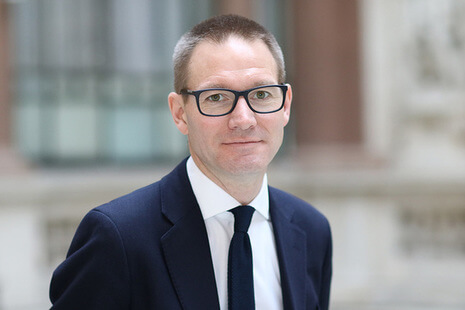
This morning we heard from Neil Wigan OBE, UK Ambassador to Israel, who gave us an excellent update on British – Israeli cooperation and current collaborative research projects. One of many, BIRAX (the Britain-Israel Research and Academic Exchange Partnership) a £multi-million initiative of the British Council and the British Embassy in Israel directed at supporting cooperation among British and Israeli researchers. The Technion is one of the partners and continues to help create and develop such partnerships between Israel and the UK.
Mahane Yehuda Market – Food tasting tour
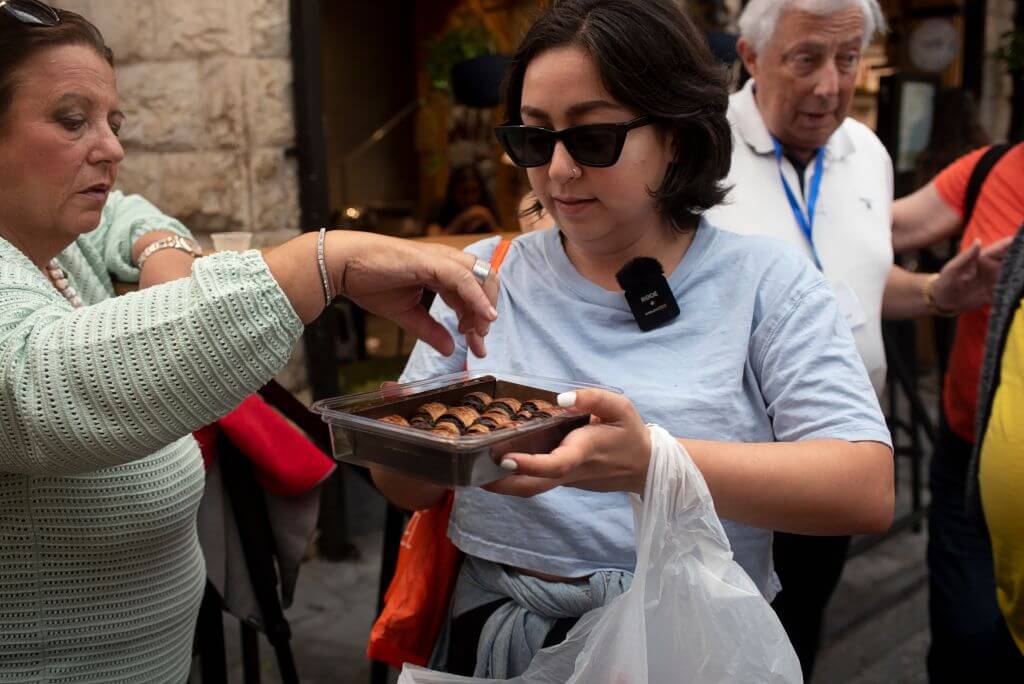
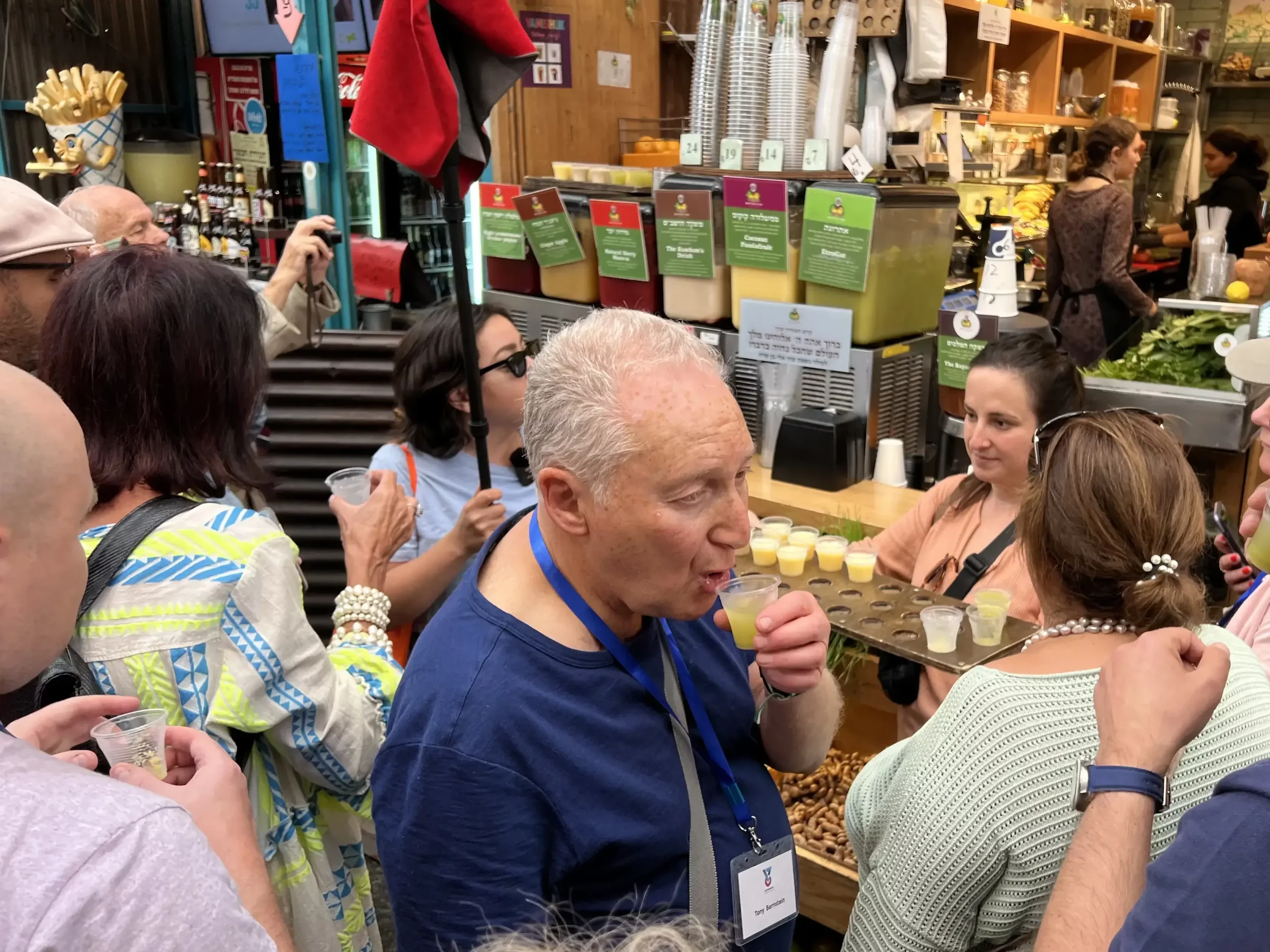
Today was our Jerusalem day. Our first stop was Mahane Yehuda Market, often referred to as “The Shuk”, which is a marketplace (originally open-air, but now partially covered). Popular with locals and tourists alike, the market houses more than 250 vendors. We were accompanied by an amazing private tour guide to show us the best food stalls in the market. We met some of the amazing and interesting vendors who form part of the market and heard their stories. We tasted a variety of different foods, including Sabich and pomegranate sorbet.
Hilma Tech
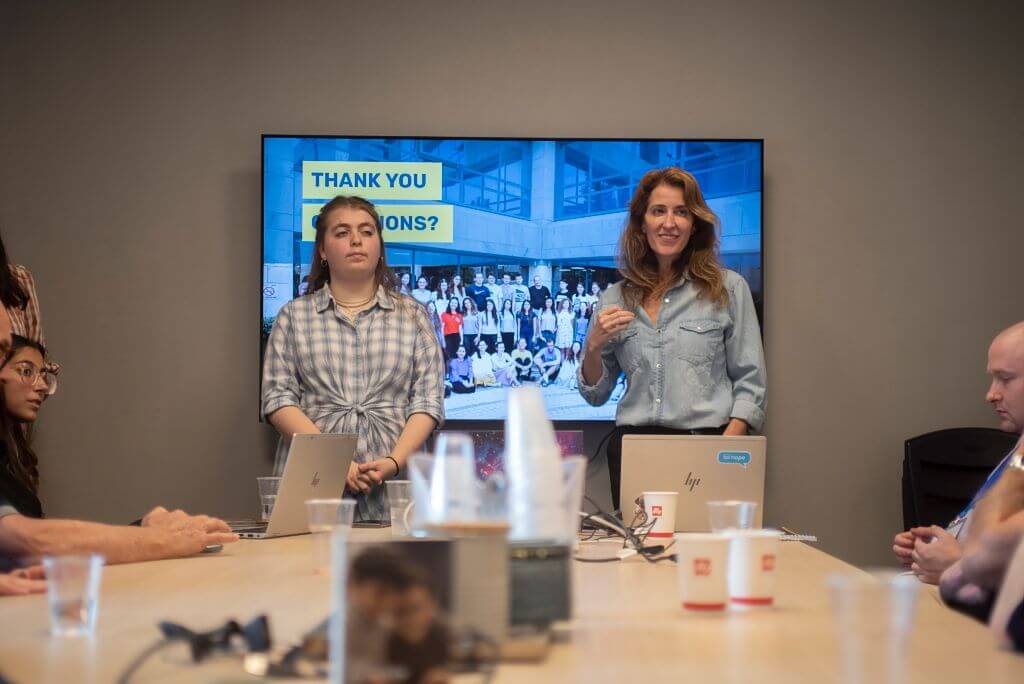
Hilma Tech is a new NGO, that has established itself as an alternative for young people in Israel who are either not eligible to be called up to the army or are exempt from National Service. Hilma Tech aims to train young people to be able to develop apps that can help the non-profit sector. They are taught computer science, coding and web design skills that will help them in their future career paths. These skilled young members of Hilma Tech are also utilised to develop apps and software solutions for non-profit organisations that in turn helps solve various challenges a given organisation might be having. One such project is Hospikol, a software platform solution that helps to improve the efficiency of nurses in hospitals by better prioritising in-patient calls. Hospikol has now completed its Beta testing and starting to enter international markets. The aim of this startup is to help find solutions for non-profit organisations in Israel and ultimately to develop applications that work and can be extended to wider populations.
Achdut Israel Synagogue in Jerusalem
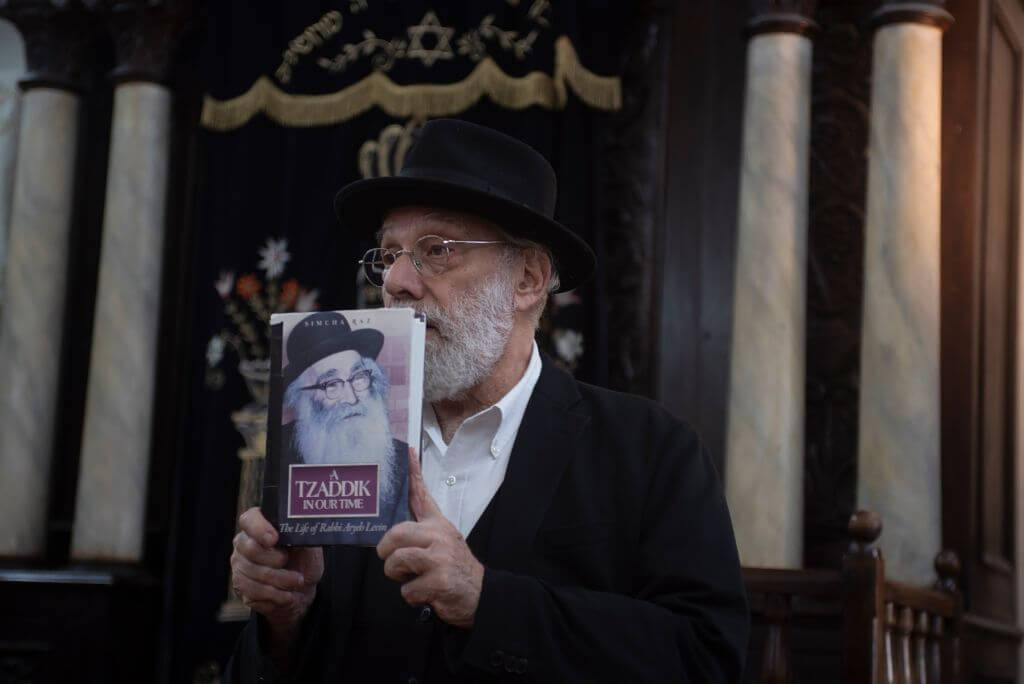
Achdut Israel Synagogue is a beautiful synagogue, which is dedicated to the memory of Olei Hagardom, the martyrs of the Irgun and Lehi underground organizations, who expedited the removal of the British Mandate from Israel. This unique place of worship is hidden on the second floor inside the old Spheradi Orphanage House of Jerusalem, not far from the Machne Yehuda Market (the Shuk) and the exotic Nachlaot neighbourhood in central Jerusalem. We were given an amazing tour of the Synagogue by Rabbi Benjy. He shared interesting stories about the Synagogue’s history, stories from his family and their relationship to the Synagogue. This synagogue was used to hide secret stashes of arms.
Museum of Underground Prisoners
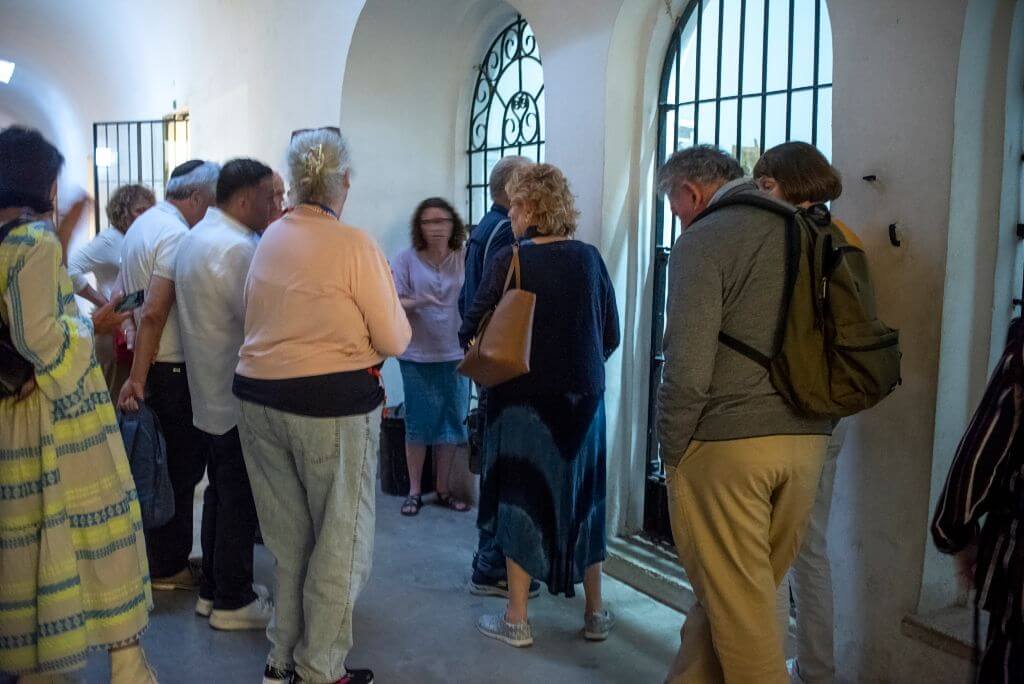
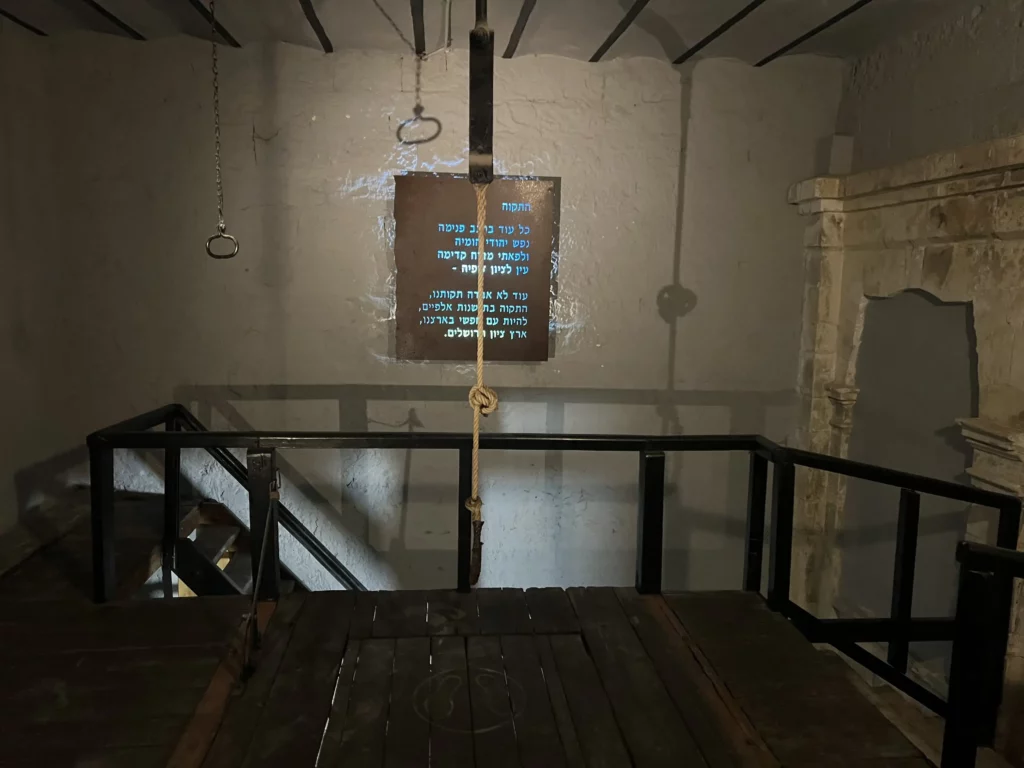
The Museum of Underground Prisoners is a museum in Jerusalem, that was established in 1920 under the control of the British mandate. Between 1920 and 1948 hundreds of members of the Jewish underground – Haganah, Irgun and Lehi – who helped challenge the British mandate period leading up to the establishment of the State of Israel.
Abu Ghosh
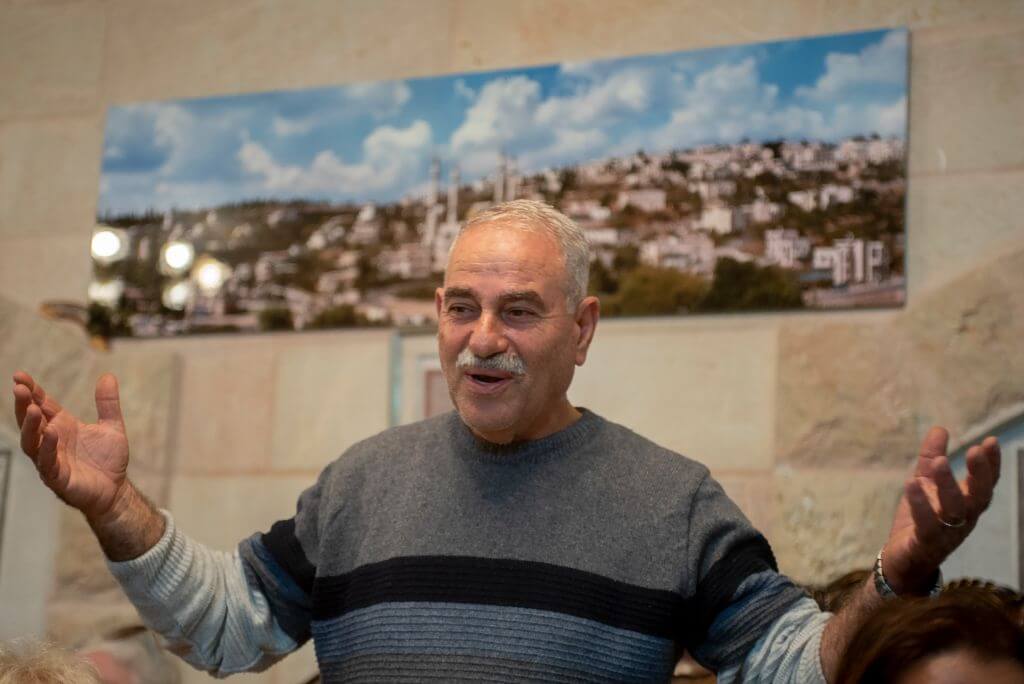
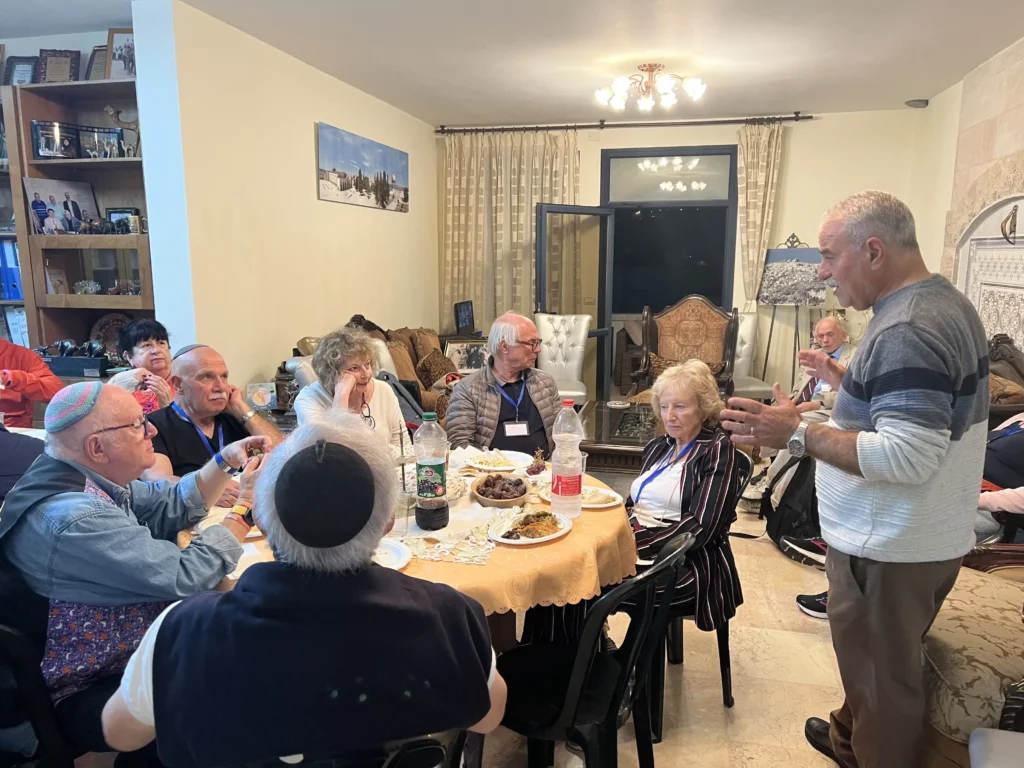
We were hosted by Issa Jaber, a Former Mayor of Abu Ghosh. Abu Ghosh is an Arab-Israeli local council in Israel, located 10 kilometres west of Jerusalem on the Tel Aviv–Jerusalem highway. It takes its current name from the dominant clan inhabiting the town. Issa told the group about the history of his town. In 1948 when the Mufti of Jerusalem encouraged all the Arab towns to evacuate their people before the war of independence and told them that they would come back to larger pieces of land, Abu Ghosh residents refused to leave Israel and demonstrated their loyalty to the country. Since that time the residents of this town have lived in total harmony with all their Jewish neighbours.
Day 1 Album
Photo courtesy of Adrian Korsner
Day 2
We are very excited to welcome you to the second day of our trip to Israel.
Briefing by Maayan Jaffe Hoffman
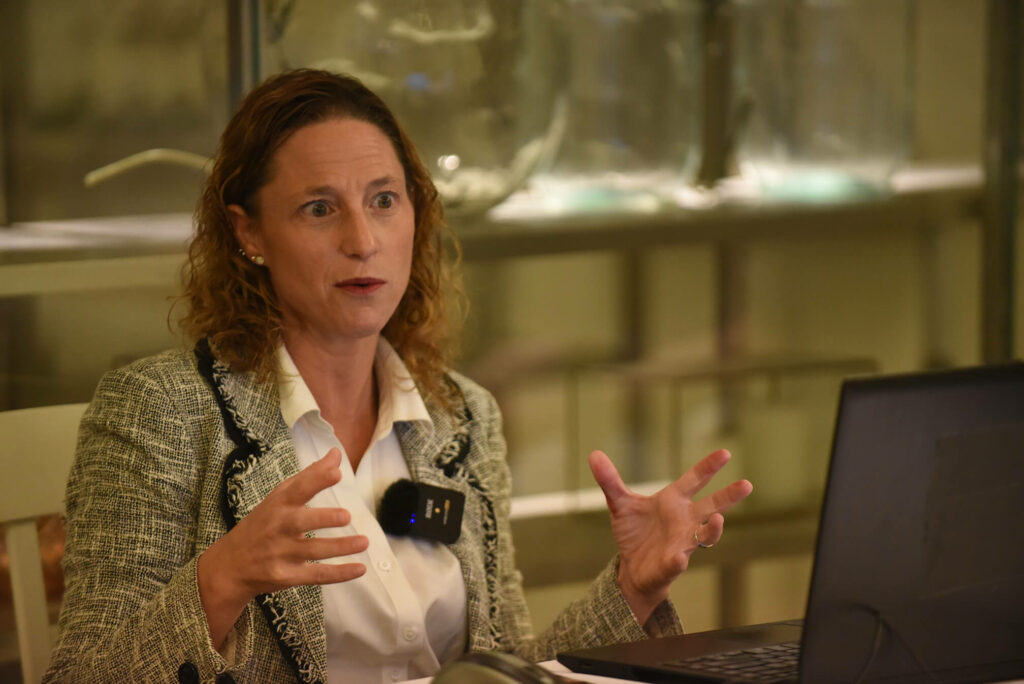
This morning we heard from Maayan Jaffe Hoffman, an editor and former head of strategy at the Jerusalem Post, who gave us an excellent briefing on recent news and updates about Israel, and its internal/external affairs. Maayan’s briefing focused on internal politics in the government and upcoming elections in Israel.
Palmach Exhibition
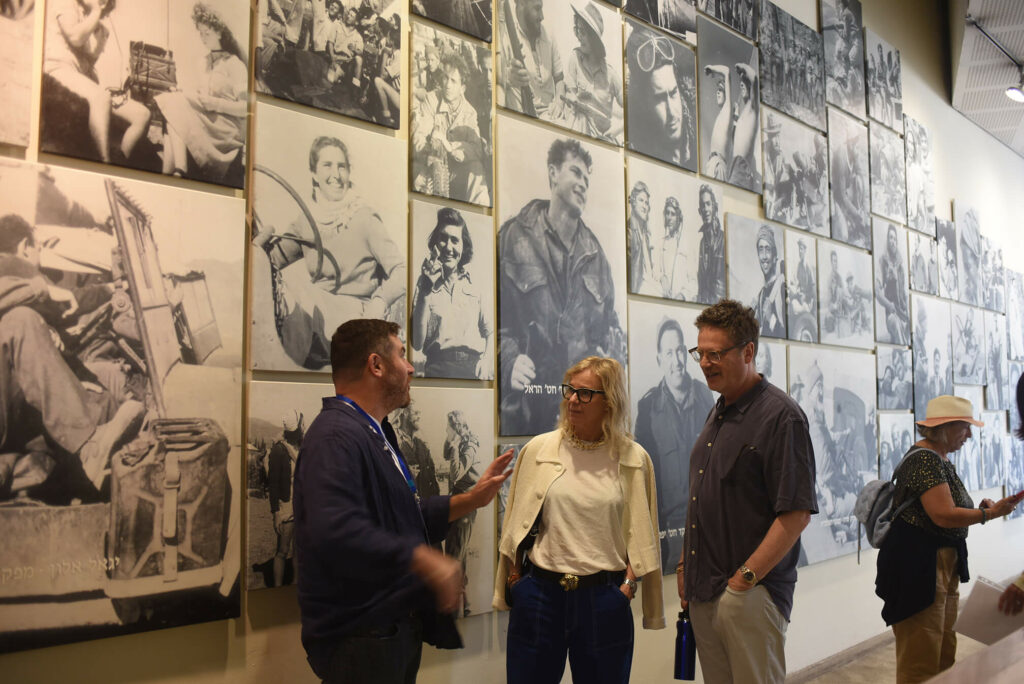
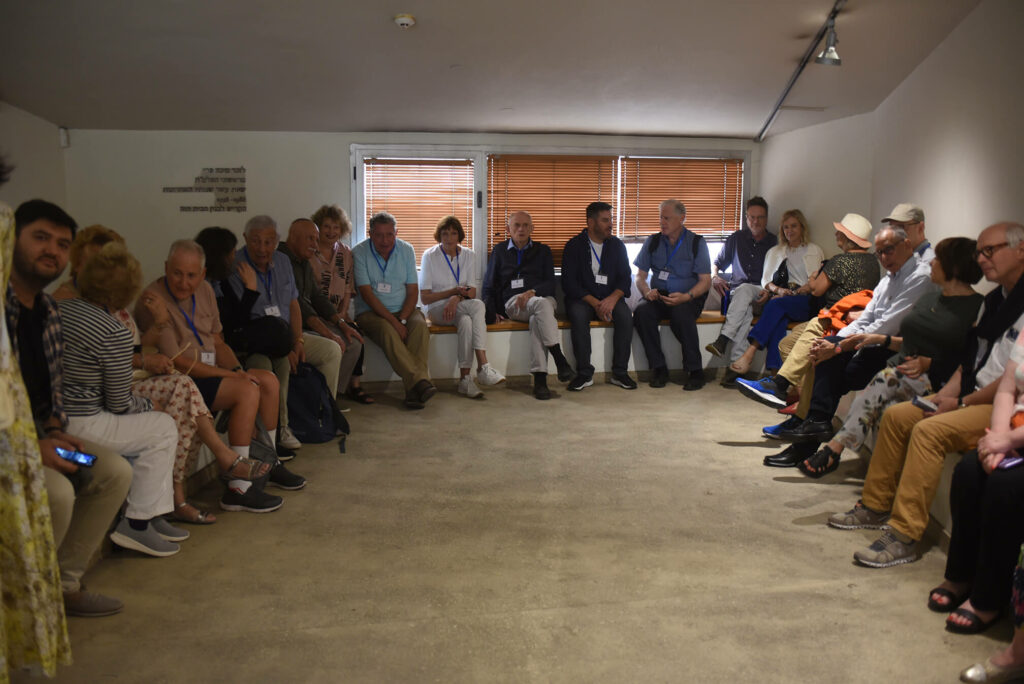
The Palmach Exhibition is located in Ramat Aviv, Israel dedicated to the Palmach, the strike force of the pre-state underground Haganah defence organization, which was later integrated into the Israel Defense Forces. Opened in 2000, the Palmach Museum commemorates the contribution of the Palmach to the creation of the State of Israel. It was designed by Israeli architects Zvi Hecker and Rafi Segal.
The Palmach museum is a centre for teaching the heritage of the Palmach-pre-state fighting units. The permanent exhibit at this site traces Palmach’s history until the end of the War of Independence. The museum also provides a memorial hall, rotating exhibits, guided tours and various educational activities. We were accompanied by an IDF soldier as a guide.
TriEye
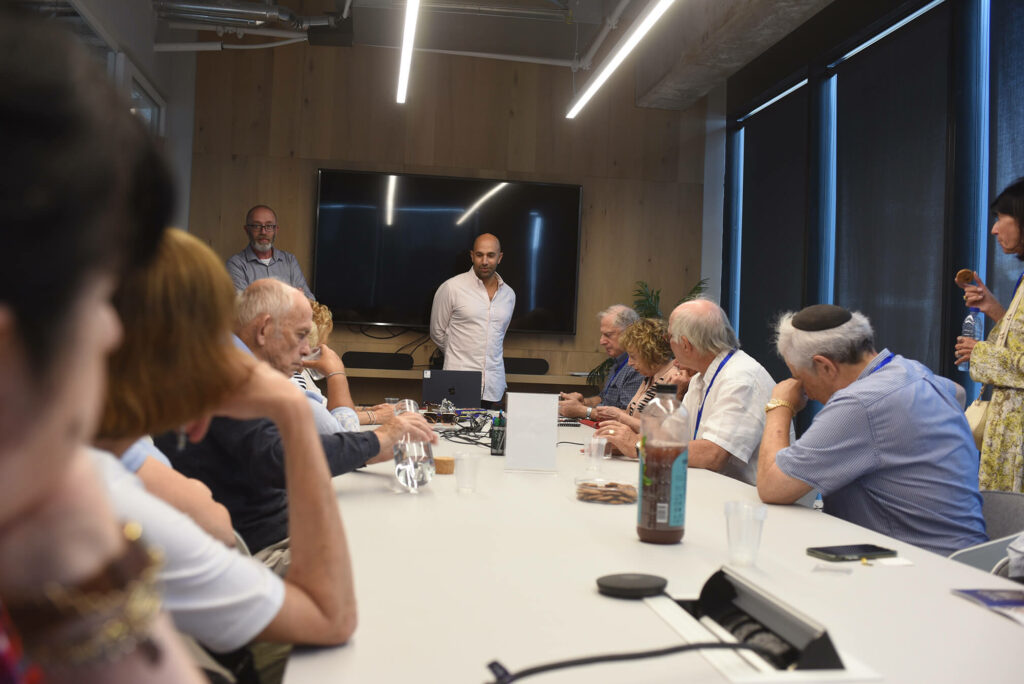
The following stop was a cutting-edge technology innovation startup called TriEye. This startup focuses on developing and producing short-wave infrared (SWIR) sensing technology. The startup has already secured US$ multi-million investments, secured 40+ partners and provides employment to 100+ highly competitive industry experts.
They aim to develop and apply the SWIR technology more cost-effectively and enable mass-market manufacturing of these sensors. In addition, by 2025 they aim to apply SWIR technology to consumer mobile devices, in such areas as beauty and other consumer applications.
At TriEye, we were hosted by Arkadiy Morgenshtein, a Technion Alumni with 4 degrees from Technion, who is now a team leader.
SpacePharma
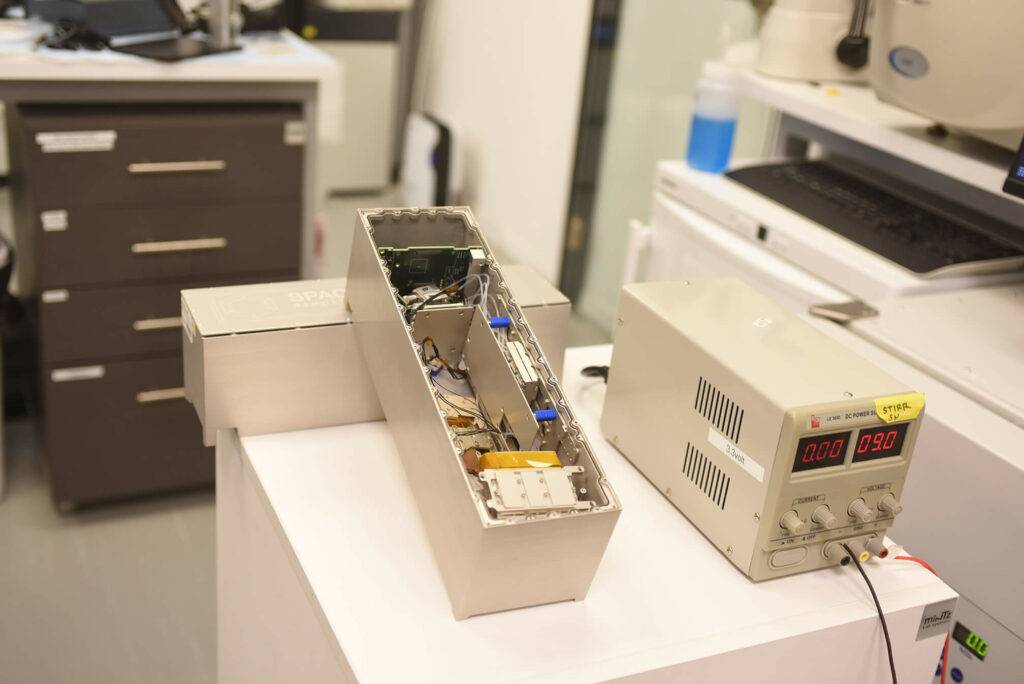
SpacePharma’s mission is to leverage the miniaturised microgravity lab technology sized as a ‘shoebox’, enabling unprecedented possibilities to develop new drugs in space. This allows many companies to carry out R&D in a close to zero gravity environment. For example, it allows researchers to experiment with growing cells in not just 2 dimensions, but in 3 dimensions when there is no gravity pulling down the substances. SpacePharma enables all this at a fraction of the costs, with higher success rates than experiments conducted with traditional research methods which previously required cosmonaut scientists engaged in the research in person in space. Now, it is possible to send a ‘shoebox’ lab to space and carry out research remotely from the earth. They are aiming to bring a positive impact on millions of lives here on earth.
Natalie Lisbona
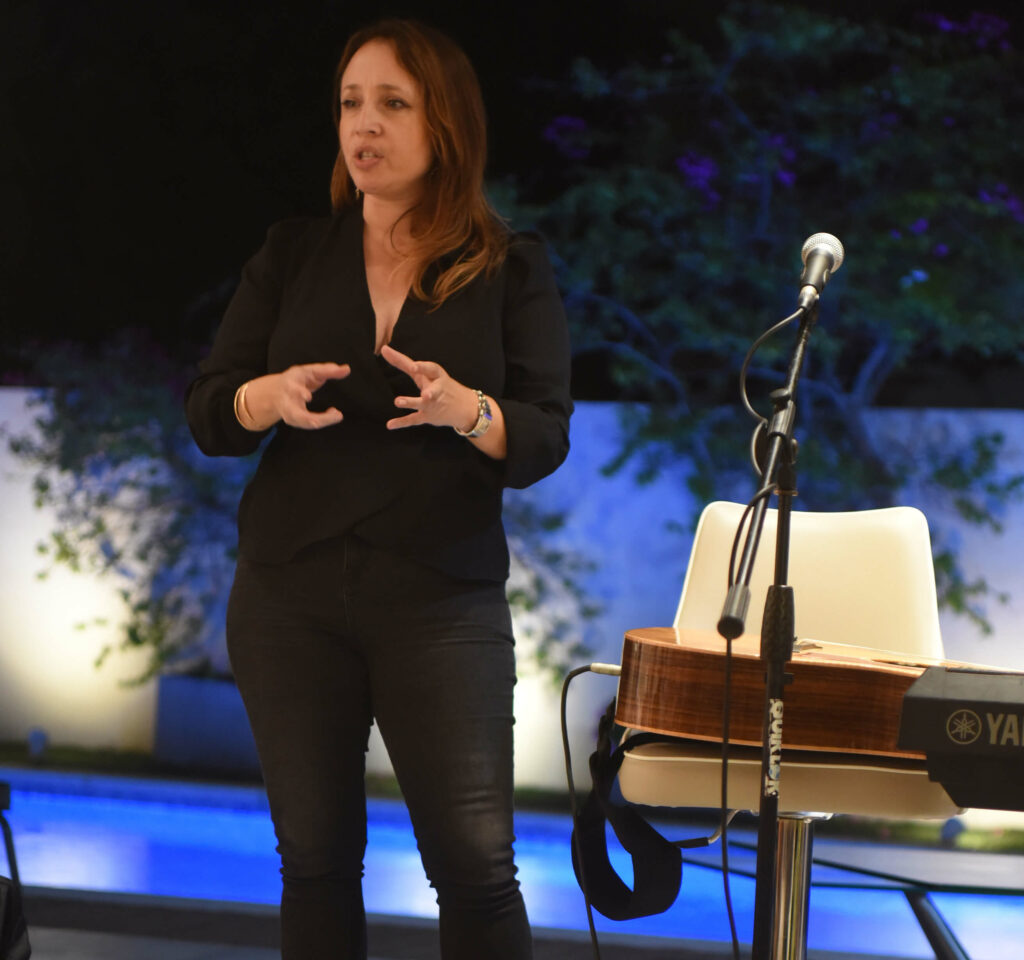
Natalie Lisbona, an Award-winning journalist shared insight into professional journalism, its hurdles and how she advocates for reporting the truth in difficult situations. She moved to Israel with her husband and 3 children 10 years ago. Natalie Lisbona is an award-winning Journalist, Fixer and Producer based in Jerusalem, Israel and the Palestinian Territories.
She reports on many topics from hard news to real life and has written for many publications. Natalie has 24 years of experience as a Producer at SKY NEWS London, BBC1 London, ITV1 Head of News Desk at This Morning London and Senior Producer at Daybreak (now GMB) London.
She is a Former Head of the News desk, Booking and Planning at Israel’s 24-hour international news channel i24NEWS which broadcasts in English, Arabic and French.
Yonina
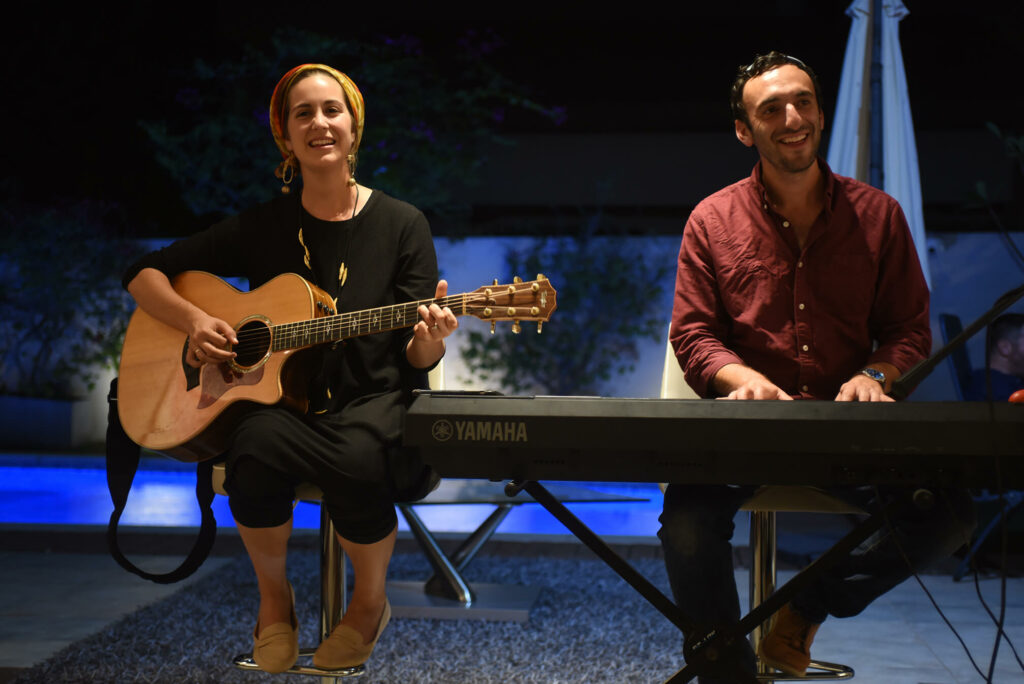
“Yonina” (a combination of their names -Yoni and Nina Tokayer) began their singing performances from the moment they met, on a beautiful balcony in Tzfat, Israel. They had both been pursuing music their entire lives, and once they met they began dreaming about making music together and now have a following of millions of people around the world. Technion UK hosted an online event with them during the lockdown, to bring a taste of Israel to our UK following and tonight we met them for the first time which was a great experience.
Major Keren Hajioff
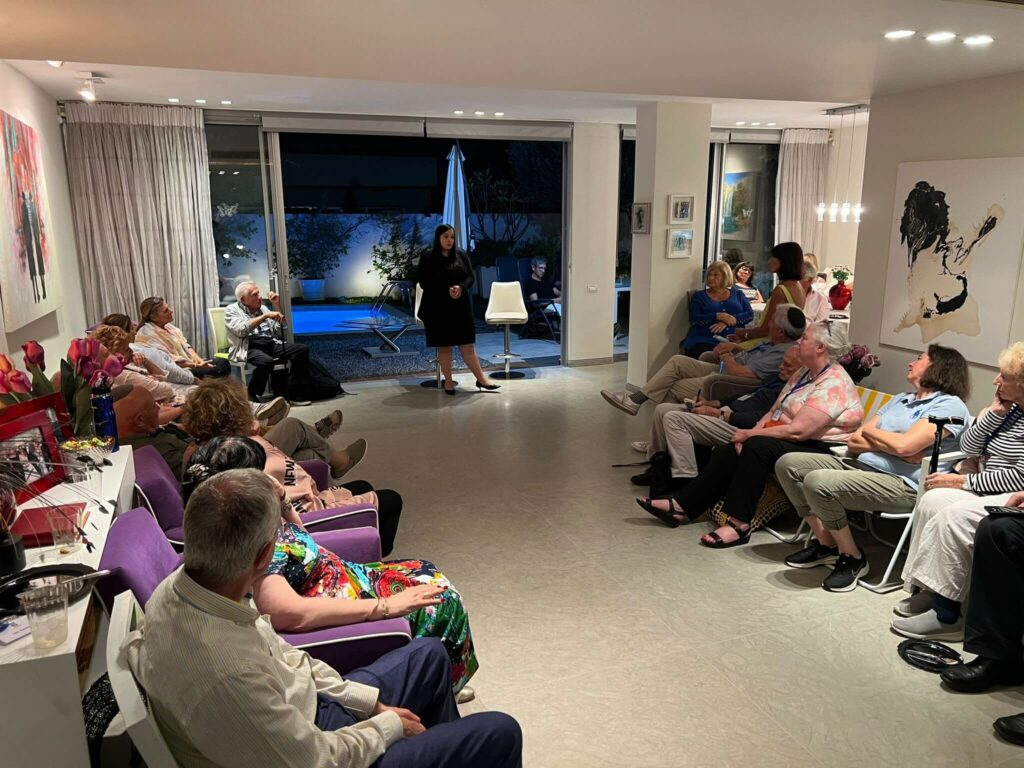
Our day was concluded by Keren Hajioff, who was the International Spokeswoman for Israel’s Prime Minister Naftali Bennett and now works as a special advisor to Lapid
Before this position, Keren Hajioff served in the IDF Spokesperson’s unit in various positions, reaching the rank of Major. Most recently, she served as the Spokesperson of the Northern Command, responsible for communicating all of the IDF’s operational activity on Israel’s borders with Lebanon and Syria to Israeli, Arabic and International Audiences.
Keren was born in the UK and came to the age of 19 after spending a year in Israel
Keren gave us an update on Israel’s political position with its allies and opponents.
Day 2 Album
Photo courtesy of Adrian Korsner
Day 3
IDF Visit
The day was kickstarted with a visit to Israeli Defence Forces (IDF) at Gideonim Camp. We were shown around by various soldiers who are part of the IDF Cyber defence unit.
IDF Cyber Defence unit is responsible for cyber defence, communication, wireless transmission, computerization, and control over intelligence information in the IDF. The Cyber Defense Directorate provides commanders in the field with the appropriate technology needed to manage a situation in the best possible way
As we were told, the cyber defence unit was established in 2003, the cyber revolution was started in 2016 by establishing the 10th combatant command in IDF.
A member of the Cyber Defence Unit training camp shared the infrastructure available for the IDF members. Full-scale server rooms capable of simulating complex, real-world-like network implementations. These simulations help IDF to train and be ready for real-world attacks and threads.
The Iron Dome
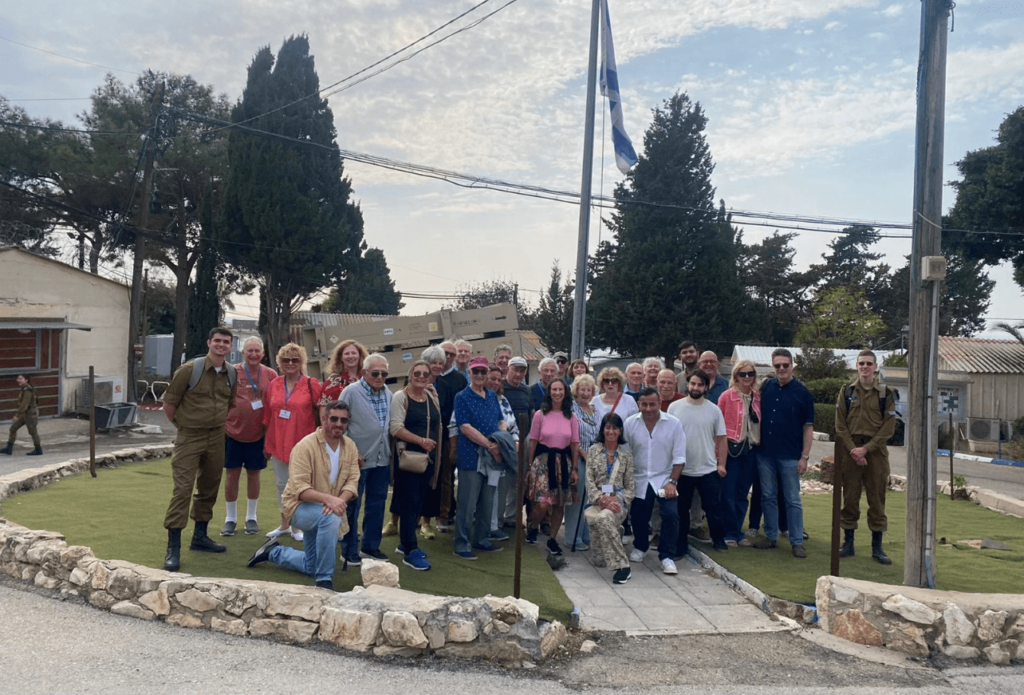
After a lovely Kosher lunch break, we were taken to one of many Iron Dome sites (secret location). The Iron Dome covers the airspace of the whole of Israel from multiple locations/sites to provide umbrella-like protection from any incoming missiles. A member of the IDF who operates one of such Iron Dome sites has shared their experience and how Irom Dome is providing Israel with a lion’s share of its air space protection.
Technion played a crucial part in inventing the Iron Dome. It was developed by four Technion graduates working for the leading security defence group Rafael.
The Iron Dome has been acclaimed for its capacity to intercept and eliminate short-range rockets and was deployed effectively by Israel during Operation Protective Edge. Its mechanism was inspired by a remote-controlled toy car.
Professor Shlomo Maital and Rafi Nave
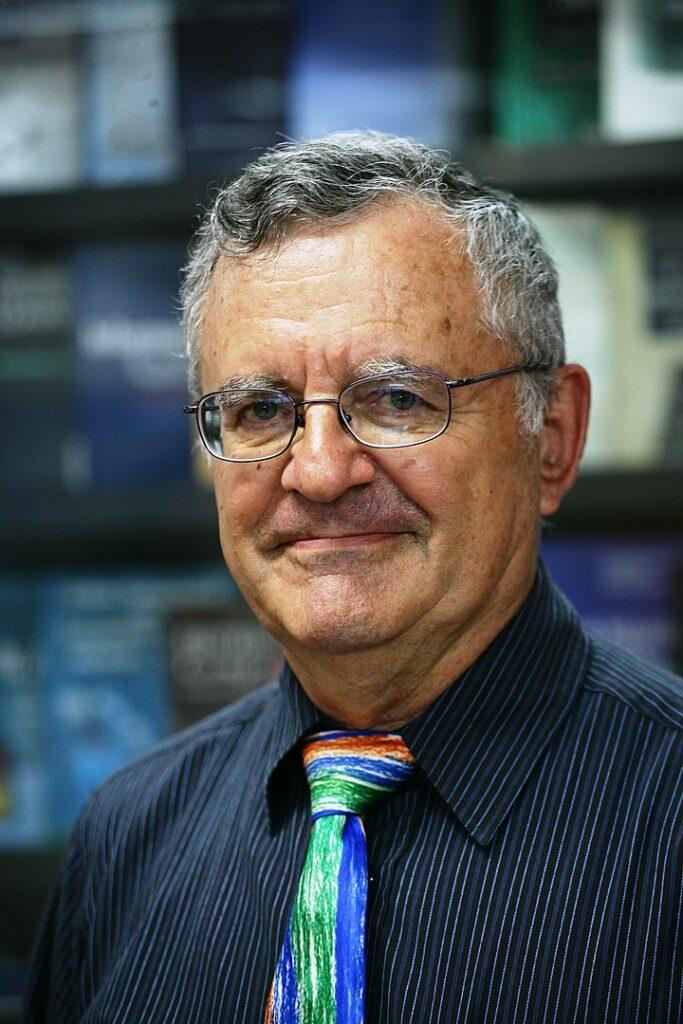
Our group met with two prominent scientists, Shlomo Maital, a professor emeritus at Technion and Rafi Nave, a leader in Israeli entrepreneurship and applied technologies with lifelong ties to the Technion.
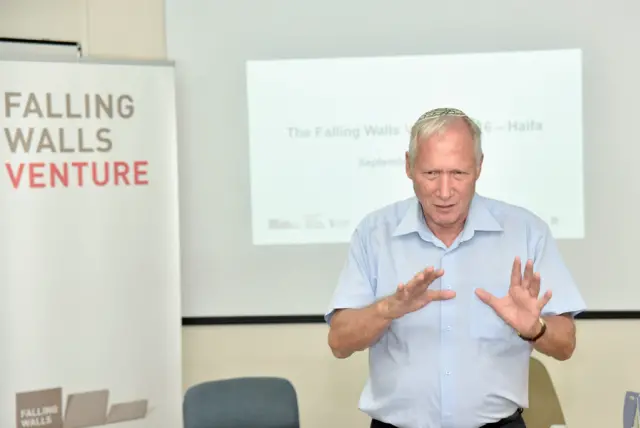
Professor Shlomo Maital and Rafi Nave were sharing some insights into their book “Aspiration, Inspiration and Perspiration”, and how Technion graduates merge creativity with technology to change the world. They spoke about a company called Insightec, a company connected to Technion which helps people who have tremors and Parkinson’s.
UK Group Meets new Technion Vice president
The New Vice President of the Technion and a professor in the Department of Material Science and Engineering at Technion, Wayne Kaplan shared how it is important for Technion to have the best Faculty members as this in turn helps students at Technion. He also outlined the importance of external contributions and support to Technion to fund Technion’s research and innovation that inevitably will contribute to Technion’s and Israel’s future.
Day 4
Dedi Meiri
Our day started with a visit to Dr Dedi Meiri, who heads the Laboratory of Cancer Biology and Cannabinoid Research in the Technion Faculty of Biology. This laboratory is the largest laboratory of its type in the world. He is also a member of the Technion Integrated Cancer Centre.
We had a very interesting and extensive lecture on his background and how he was the first licence holder in Israel to run a Cannabis lab to research cannabinoids and develop science in cannabinoids. As a result, many thousands of patients are now receiving cannabinoid treatments against a vast variety of diseases and illnesses.
Cannabis lab
Next, we went to the cannabis lab where all the work exploring and researching thousands of types and strains of cannabinoids is carried out. With almost 50 members in the lab, Dr Dedi Meiri introduced a few members of his team who in turn shared some details of the amazing work they do in the lab and at Technion.
Technion Visitor Centre
The group experienced a wonderful tour of the visitor centre which incorporates a 360-degree cinema and museum exhibits. The film introduced some of the brilliant Nobel prize winners of the Technion and some other amazing individuals together with their extensive contribution to Technion and the greater bank of knowledge in science and technology.
Nikol, a Technion student shared some amazing insight into the campus life of students and how self-sufficient campus life can be in terms of resources provided on campus, such as the cinema, gyms, supermarkets and other day-to-day needs.
Tunisian mosaic synagogue (Or Torah)
The next stop was at the Or Torah or Djerba Synagogue in Acre, built after the El Ghriba synagogue in Djerba. The beautiful building was erected in 1955. It is covered with millions of mosaics inside which have been manufactured at Kibbutz Eilon. The building has 140 stained glass windows and a dome.
Crusader Fortress
After an amazing kosher Levantine lunch at Roots, we headed to the Crusader Fortress joined by Uri, our private guide. Uri, who also happened to be a Technion graduate who is now retired from the commercial world and became a guide, share very interesting stories about the fortress and its history.
We were told by Uri that the Crusader Fortress is a UNESCO-protected archaeological treasure in Acre. The Crusader Fortress was built by the Knights Templar in the 12th century. The north of Israel houses many archaeological treasures. It was built and inhabited by the Knights Templar at the turn of the 12th century.
Following our Crusader Fortress visit, we also had a chance to see the Templar Tunnel. The Templars were knights-monks who lived in the Citadel. The Templars dug the secret tunnel underground, right under the city houses, which connected the Citadel to the port of Acre. The tunnel is 150 meters long and it was discovered only in 1994. Today, seawater and groundwater flow inside the tunnel but we were able to walk through it following our guide, which brought us to a beautiful view of the sea.
A beautiful view of Haifa
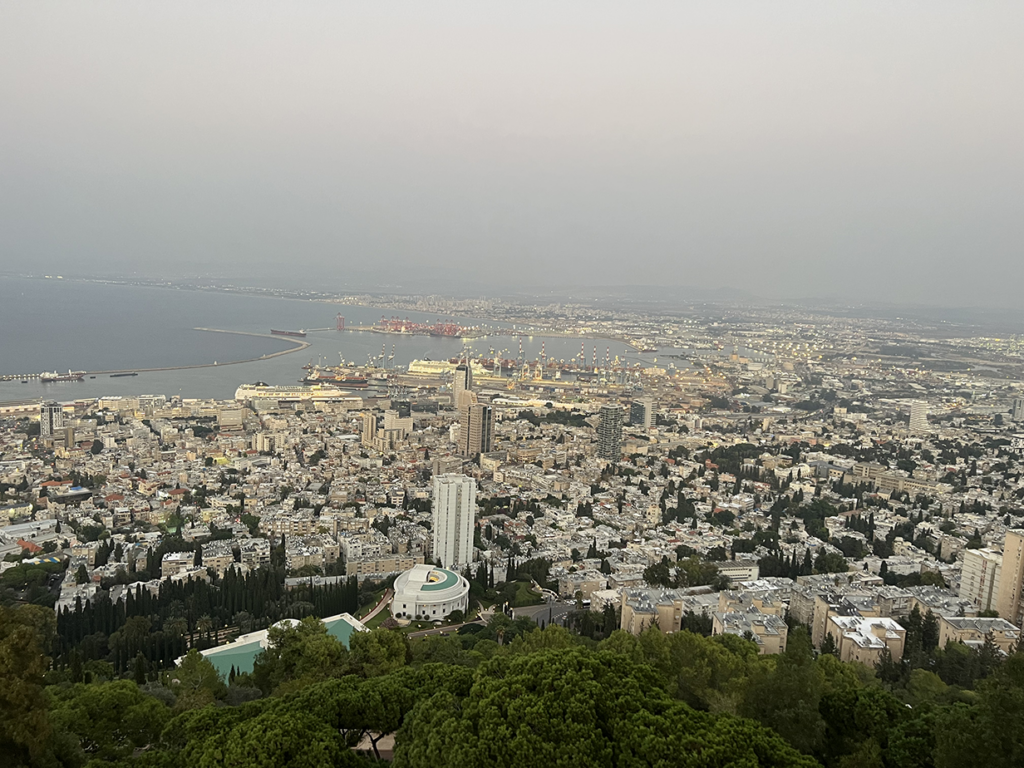
The day ended with the group having dinner and drinks on the roof of the Dan Carmel hotel with an amazing view of this special city.
Haifa is Israel’s 3rd largest city. It is situated on the slopes of Mount Carmel and faces the Medeterenian sea. The city is famous across Israel for its mixed populations of Jews and Arabs. Here they live in peaceful coexistence.
Day 4 Album
Day 5
Yona Yahav – Ex Mayer of Haifa
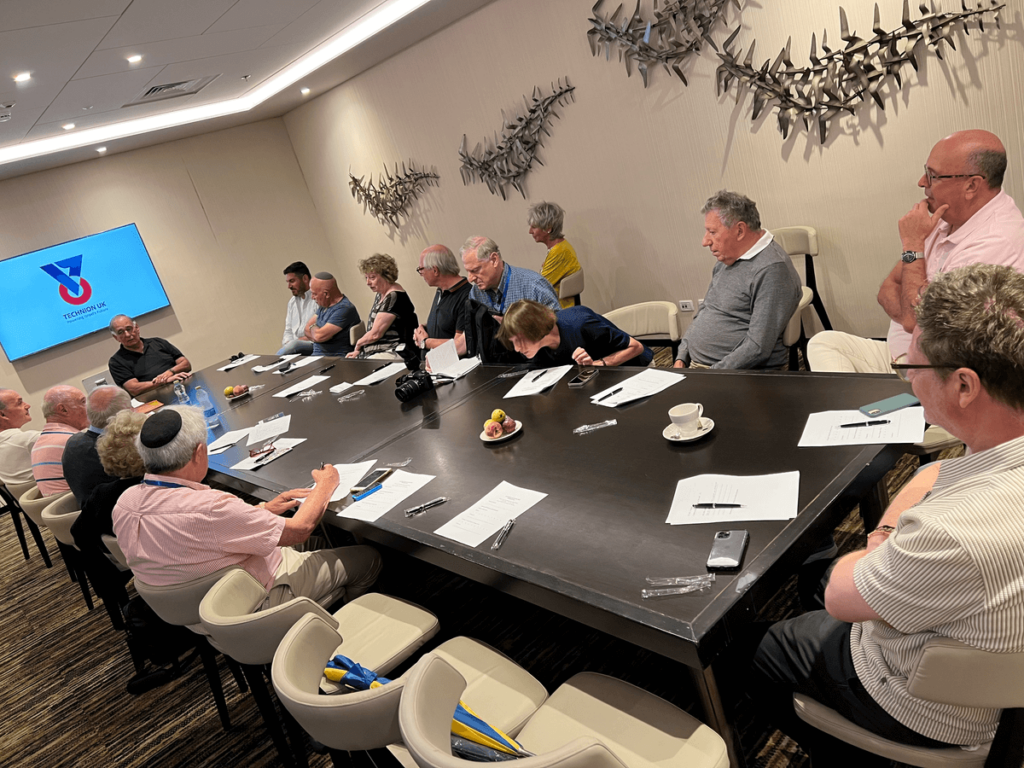
The last day of our trip started with a speech from Yona Yahav an Israeli lawyer and politician. Yahav was the mayor between 2003 and 2018 of Haifa, the capital of the north.
Yona Yahav shared the work he has accomplished during his time as a Mayer of Haifa and the hurdles and difficulties he had to overcome to contribute to the development of Haifa socially, politically and economically.
He spoke about how 30 years before the state of Israel was established, visionaries at the Technion decided to open an institution dedicated to science and technology. At the start, there were only 17 students, now there are 16,000.
Carmel Winery private tour
Next, we visited Carmel Winery, founded in 1882, products of which are exported to over 40 countries. It is the largest winery in Israel, with a local market share of almost 50%. We were told, Carmel Winery produces over 60 million bottles of Wine yearly. We were also shown by the private tour guide the process of making Kosher wine and the cellar where it is stored. Our Carmel Winery tour concluded with a wine tasting of Carmel Wines.
Highlights of the trip from our group members
Our Oct’22 tour concluded with the whole group sharing their impressions and highlights they had during the trip. Many group members enjoyed the talks given by the startups TriEye and SpacePharma as well as meeting Yona Yahav and other speakers during the trip.
Technion’s innovative achievements
Technion UK Legacies
Day 5 Album
March’22 Trip updates (Click here)
Day 1
We are very excited to welcome you to the first day of our trip in Israel. This morning we heard from Maayan Jaffe Hoffman, an editor from Jerusalem Post, who gave us an excellent briefing on recent news and updates about Israel, its internal/external affairs, COVID-19 progress in Israel and further afield.
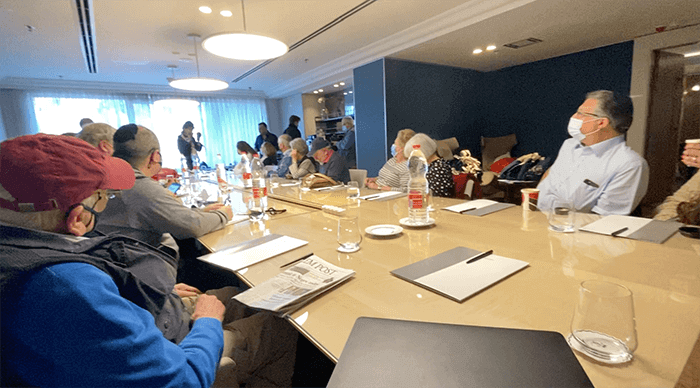
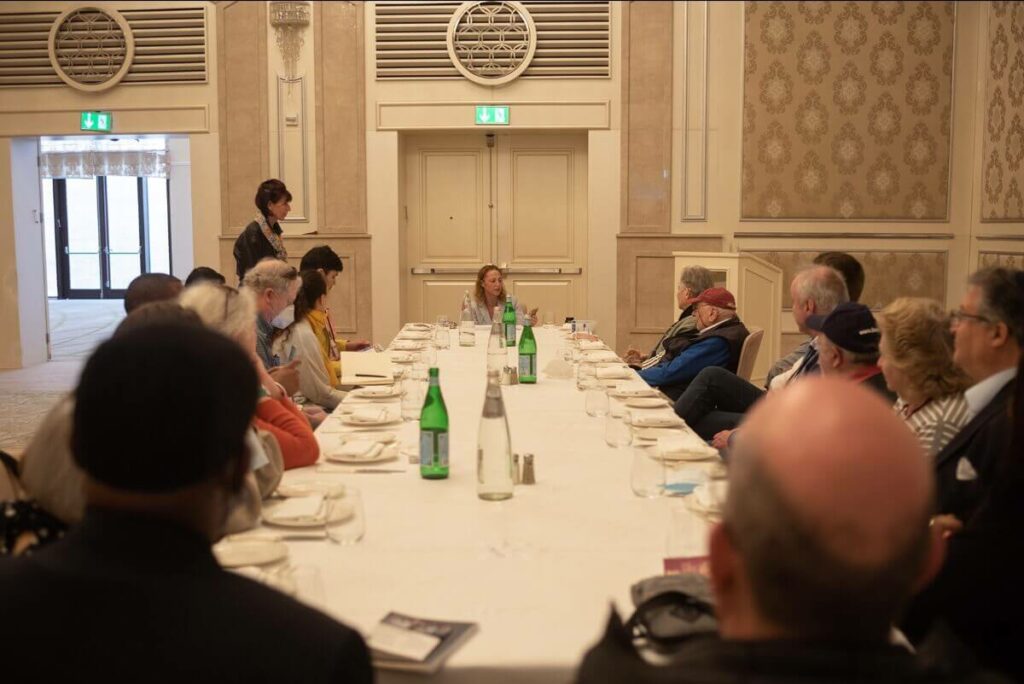
David Horovitz
David Horovitz is the founding editor of The Times of Israel. He shared some recent news from Israel and around the world. He is the author of “Still Life with Bombers” (2004) and “A Little Too Close to God” (2000), and co-author of “Shalom Friend: The Life and Legacy of Yitzhak Rabin” (1996). He previously edited The Jerusalem Post (2004-2011) and The Jerusalem Report (1998-2004). He is the founder and editor of the Times of Israel ten years ago and now has more then 10 million daily readers. It is the most read English news vehicle about Israel, in the world. David was originally born in the UK and moved to Israel in his 20s.
Micky Rosenfeld
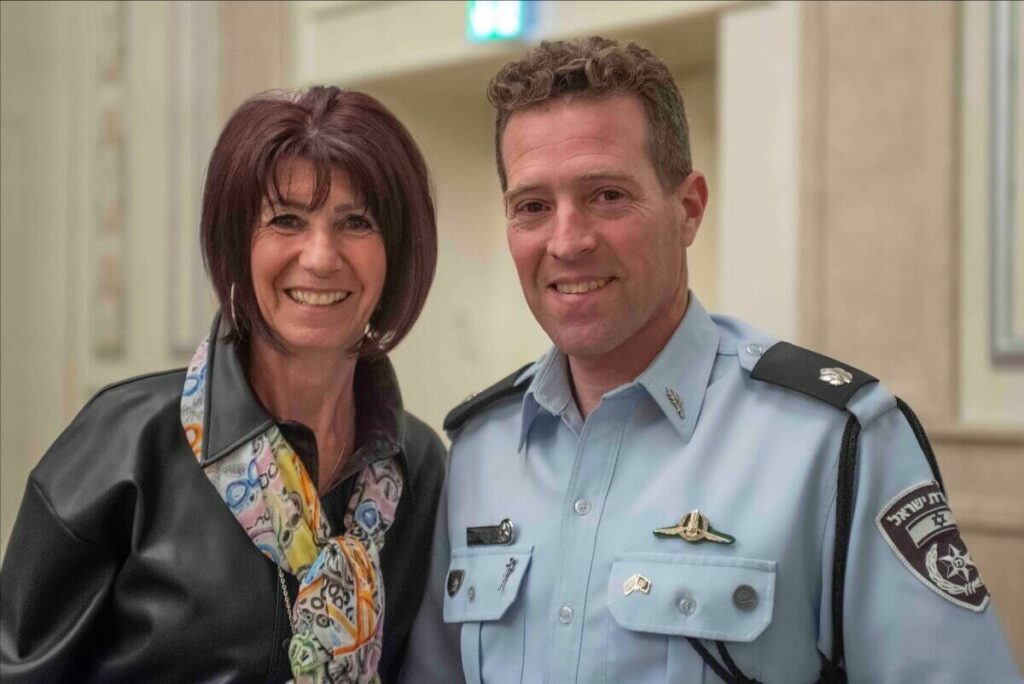
Briefing from Superintendent Micky Rosenfeld. He is the former Israel Police National Spokesman to the foreign Media.
He was appointed to this position as an Inspector in 2005 after serving for eight years as a combat officer in the Yamam counter-terrorism unit. Micky now helps the Israeli Police force establish international relations around the world and he speaks to high level visiting delegations. He is currently the Head of International Cooperation Israel National Police. Micky was also born in the UK and moved to Israel aged 24.
Hearing from these excellent journalists and speakers on our first day gave the group the background knowledge on the current security situation and foreign affairs.
Hilma Tech
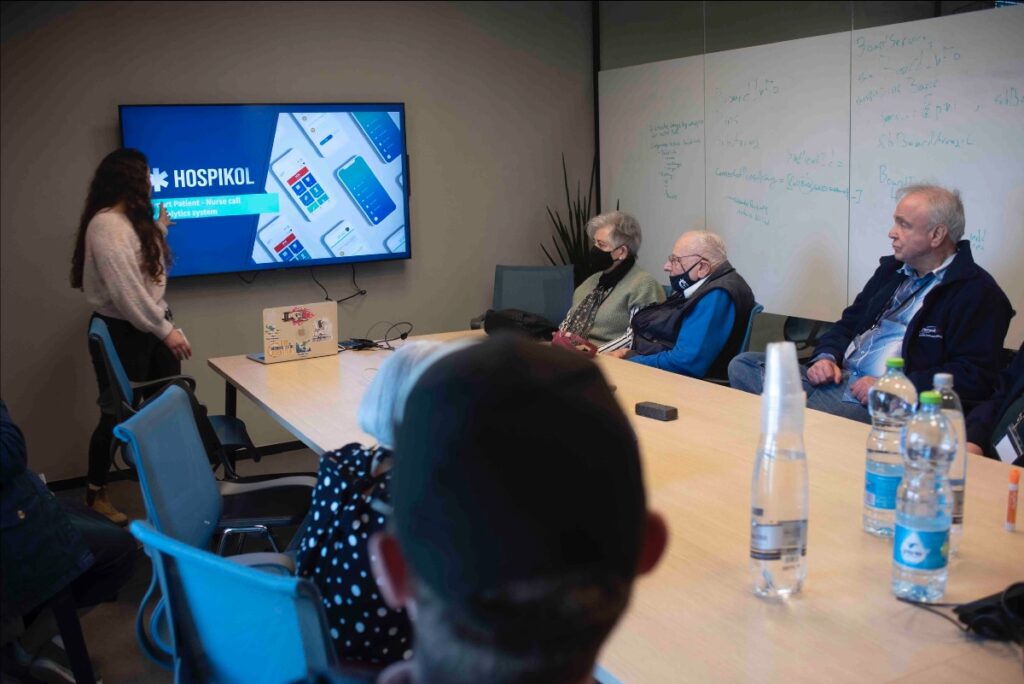
We visited a new NGO Hilma, that has established itself as an alternative for young people in Israel who are either not eligible to be called up or are exempt from National Service. Their aim is to train young people to be able to develop apps that can help the non-profit sector. They teach young people skills in computer science, in coding and web design that will help them in their future career paths.
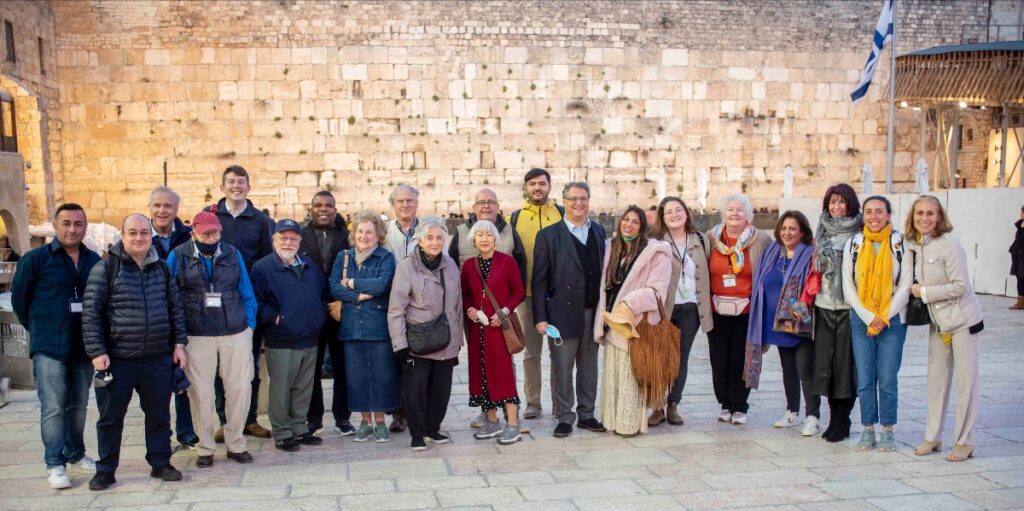

Dinner
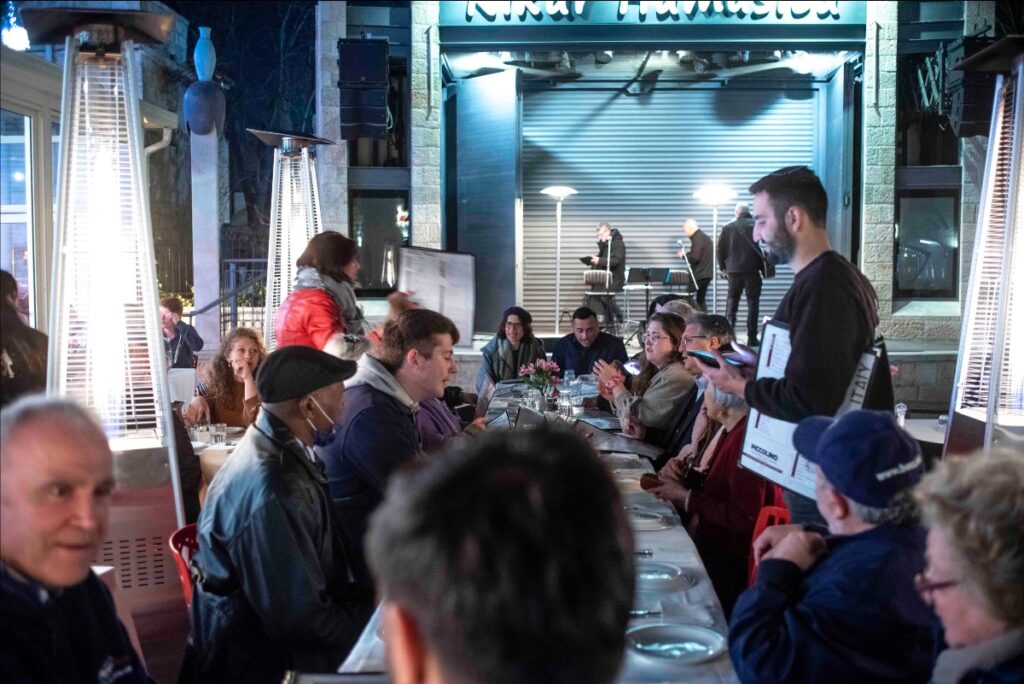
At the end of long and informative day the group had dinner in Jerusalem at a Kosher restaurant in the Music Square, entertained by live singers throughout the evening. The restaurant is famous for opening its doors to Lone Soldiers once a week, who they invite for a meal as their guests.
Day 1 Album
Photo courtesy of Adrian Korsner
Day 2
Welcome to day 2 of the Technion UK Virtual Trip to Israel 🇮🇱. Here is a short update on the events that took place today during our 2nd day of travelling in Israel. We are sorry that you cannot be with us this time, but hopefully the next trip.
Efraim Halevy
Efraim Halevy was born 2 December 1934. He moved to Israel and went on to become an Intelligence expert and diplomat. He was the 9th director of Mossad and the 3rd head of the Israeli National Security Council.
Efraim Halevy shared his achievements during his career in Mossad and Israeli National Security Council. He also shared his opinion on global current affairs, including some of his meetings with world leaders, such as King Hussain of Jordan and other Arab leaders.
Carmel Market – Food tasting tour.
The Carmel Market first opened in 1920, some eleven years after the establishment of the city. It is an integral part of the history of Tel Aviv. Our group had an amazing food tour visiting delicious food stalls and having food tastings. We met some very interesting vendors, some of whom have been at the market for more then 20 years.
StoreDot – Startup
StoreDot is a cutting edge pioneer startup that is focusing on the extreme-fast charging batteries. Their aim in the coming decade is to take fast charging of electric vehicle batteries to the same time it take to fuel combustion engine vehicles.
StoreDot.Ltd is a battery developer and materials innovation leader, developing ground-breaking battery technologies based on the design and synthesis of both organic and inorganic compounds. Replacing known materials and technologies with enhanced electro-chemical properties, StoreDot’s prorietyary compounds, conbined with nano-materials, are optimized for Extreme Fast Charging – XFC of electric vehicles.
SpacePharma – Startup
SpacePharma’s mission is to leverage the miniaturised microgravity lab technology sized as a ‘shoebox’, enabling unprecedented possibilities to develop new drugs in space. This allows many companies to carry out R&D in close to zero gravity environment. For example, it allows researchers to experiment growing of cells in not just 2 dimensions, but in 3 dimensions when there is no gravity pulling down the substances. SpacePharma enables all this at a fraction of the costs, with higher success rates than experiments conducted with traditional research methods which previously required cosmonaut-scientists engaged in the research in person in the space. Now, it is possible to send a ‘shoebox’ lab to space and carry out the research remotely from earth. They are aiming to bring a positive impact of millions of lives here on earth.
Evening event at a private villa with live entertainment
“Yonina” (a combination of their names -Yoni and Nina Tokayer) began their singing performances from the moment they met, on a beautiful balcony in Tzfat, Israel. They had both been pursuing music their entire lives, and once they met they began dreaming about making music together and now have a following of millions of people around the world. Technion UK did an online event with them during lockdown, so as to bring a taste of Israel to our UK following and tonight we met them for the first time which was a great experience.
We had an amazing night filled with music, singing, dancing, laughter and food. More about Yonina here.
Day 2 Album
Photo courtesy of Adrian Korsner
Day 3
Madatech Museum
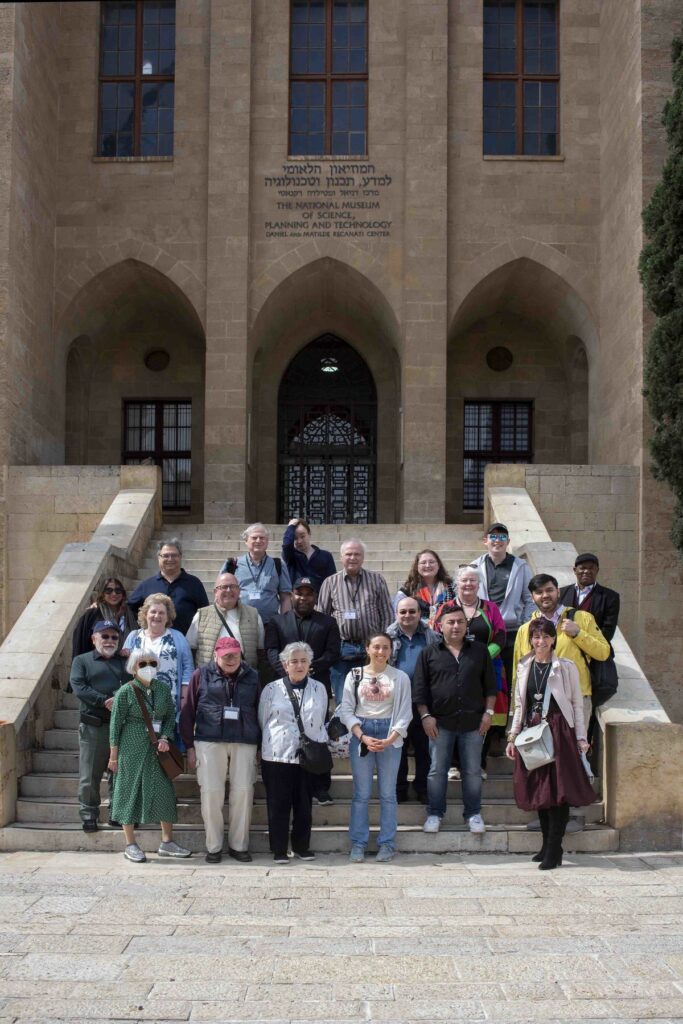
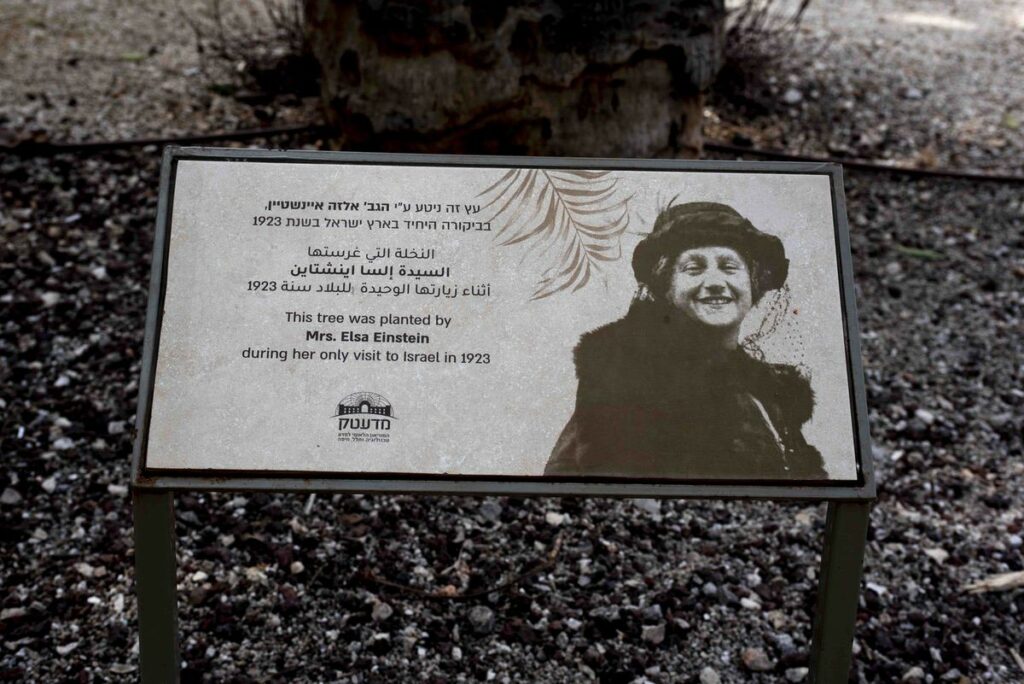
MadaTech was the original building of the Technion. On April 12, 1912 the Cornerstone of the Technikum (later changed to Technion) – a new technological education institute, was established.
Established in 1983, MadaTech Museum was housed in the historic landmark, “Technion building”, located at the heart of a 7 acre green campus in mid-town Haifa. The campus also features the Northern Garden, where the palm tree planted by Professor Einstein and Mrs Einstein in 1923 still stands.
MadaTech stands out as an excellent education and cultural centre and as leader of museum based and scientific education as well as culture in Israel. It arouses curiosity and creativity amongst young people and motivates them to learn, investigate and consider a profession in science and technology.
Technion Visitors Centre Tour
The group experienced a wonderful tour of the visitor centre which incorporates a 360 degree cinema and museum exhibits. During lunch the group met some students including Rani, a Druze student in his first year of 5 years which will include his army service, and Benamin, a first year Ethiopian student.
Abi Newman
We met a PhD student at the Technion who came to the university from Imperial Collage in the UK to do her undergraduate 4 years ago. She works in the laboratory of Shulamit Levenberg and is focused on tissue engineering. We were fortunate to listen to a lecture given by Abi, after which she gave us a tour of her laboratory.
Professor Peretz Lavie – was a former President of the Technion
Professor Lavie was the president of the Technion – Israel Institute of Technology of 3 consecutive terms until 2019. He set up a sleep research laboratory, which was then the first laboratory to diagnose sleep disorders. Now called the Center for Sleep Medicine, it currently has four branches in Israeli hospitals. Through these research facilities, over 120,000 people have been tested.
Professor Lavie’s Technion Presidency witnessed the reception by Technion of its 3rd Nobel Prize in Science. In 2011, the Nobel Prize in Chemistry was awarded to Prof. Dan Shechtman for the discovery of quasicrystals. He was succeeded as President by Uri Sivan who is still the current President. Professor Lavie explained to the group some of the highlights of his tenure, especially the establishment of a campus in Guangdong in China and a joint campus in New York at Cornell University.
We also learnt some key facts regarding sleep apnea and were told that the optimal number of hours to sleep is from 7 to 8,5 hours.
Dinner at Druze Village
In the evening we visited a Druze village called Isafiya. The Israeli Druze are a religious and ethnic minority among Arab citizens of Israel. In 2019, there were 143,000 Druze living in Israel and the Golan Heights, 1.6% of the total population of Israel and the Golan Heights. Even though the faith originally developed out of Ismaili Islam, Druze do not identify as Muslims. In 1957, the Israeli government designated the Druze a distinct ethnic community at the request of its communal leaders. The Druze are Arabic-speaking citizens of Israel who serve in the Israel Defense Forces. Members of the community have attained top positions in Israeli politics and public service. Before the establishment of the State of Israel, the Druze were not recognised as a religious community, and were discriminated against by the judicial system. They live mainly in the north of the country.
We enjoyed a delicious traditional Druze dinner and received a briefing from Dr Anan Wahabi, who is a reserved Colonel in the Israel Defence Forces. Anan explained to the group about the history of his community and spoke about the loyalty of the Druze community in Israel.
Day 3 Album
Photo courtesy of Adrian Korsner
Day 4
Elbit Systems

Our first stop on day 4 was at Elbit Systems. They are an International high tech company engaged in a wide range of programmes throughout the world, primarily in the defence and homeland security arenas. They develop and supply a broad portfolio of airborne, land and naval systems and products for defence, homeland security and commercial applications.
Elbit Systems partners with the USA, the UK and some European countries amongst others. Elbit Systems also provides strong support to Israel’s defence. This company has an annual revenue of US$5.2B and invest a staggeringly high amount of more than half a billion dollars a year in R&D.
For obvious security reasons, we were not allowed to photograph or video record out visit.
Clandestine Immigration and Navy Museum – Haifa
This museum records the military naval history of the State of Israel from the days of clandestine immigration during the British Mandate. It also displays the direct connection between clandestine immigration, the Palyam (the naval platoon of the Palmach) and the naval service of the Haganah, prior to the establishment of the State, and the establishment of the Israeli Navy and its operation since its early days until today.
The group watched some incredibly interesting films that showed clearly how people who were escaping after the Second World War and wanted to come to Israel, gave their lives to do so. At that time Britain had a mandate in that area and made it illegal for refugees to enter Israel, despite their desperate circumstances.
Many of the thousands of illegal Jewish immigrants were captured by the British and interned in detention camps in Israel and Cyprus.
Many of these detainees were trained by the Palmach whilst in these camps and later became the first soldiers and navy of the Israeli army.
We leant a great deal about Israel’s clandestine immigration and naval history during our private tour.
The group were able to go onto the last boat ever captured by the British.
Professor Shlomo Maital and Rafi Nave
We heard from Shlomo Maital, a professor emeritus at Technion and Rafi Nave, a leader in Israeli entrepreneurship and applied technologies with lifelong ties to the Technion.
Professor Shlomo Maital and Rafi Nave were sharing some insights into their book “Aspiration, Inspiration and Perspiration”, and how Technion graduates merge creativity with technology to change the world.
They spoke about a company called Insightec, a company connected to the Technion which helps people who have tremors and Parkinson’s. One of the group who has tremors was very excited to hear about this and we have found a hospital in London that uses the Insightec technology who he will be meeting with on his return to the UK.
Juludan Prize Giving Ceremony
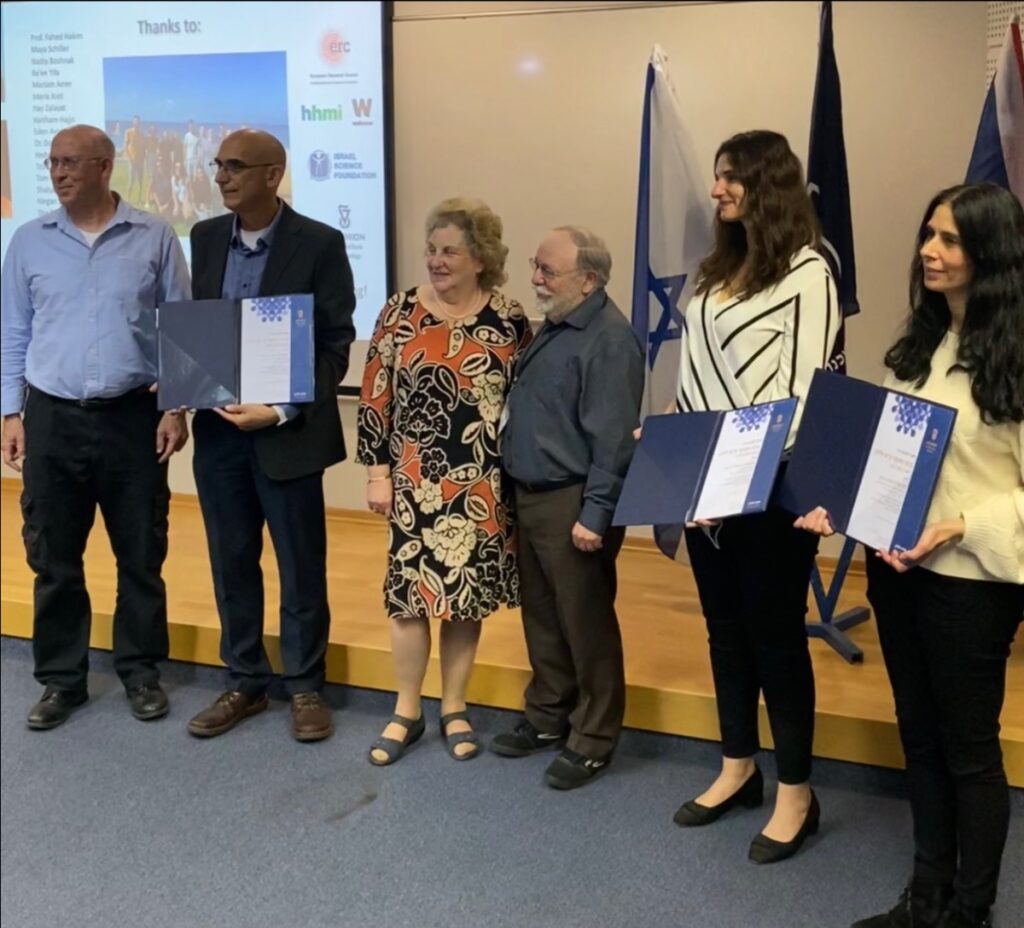
Uri Sivan the 17th President of the Technion
Uri Sivan, an Israeli physicist, is the 17th President of the Technion welcomed our delegation in Technion and congratulated the Juludan Prize winners. President Sivan also shared Technion’s future strategic plans of exploring philosophy and art in Technion.

Day 4 Album
Photo courtesy of Adrian Korsner
Day 5
Shuli Shwartz – Drive Technion Accelerator
Shuli Shwartz gave an overview of the Entrepreneurship and Innovation Ecosystem at the Technion which includes the Four Pillars: t-hub, The Knowledge Center for Innovation at the Technion, Technion Technology Transfer and the Technion Drive Accelerator.
The group heard how the Technion encouraged students not just to study but to think in an entrepreneurial way. All students at the Technion are offered an entrepreneurial course to take.
Meeting British council director at British Ambassador’s residence.
Jonathan Shor, the Director of the British Council Israel, shared a few interesting facts and statistics about Israel and the UK’s cooperation in such areas as Higher Eduction & Science, Arts, Culture and the English language. Jonathan also shared interesting facts about BIRAX (the Britain Israel Research and Academic Exchange Partnership) which is a £multi-million initiative of the British Council and the British Embassy in Israel, together with the Pears Foundation, investing in world-leading research jointly undertaken by scientists in Britain and Israel.
Day 5 Album















































































































































